#An Idealist can be the most evil person in the world
Text
There’s this thing I’ve been noticing a lot about typing INFP’s and that is the tendency to Manic Pixie Dream Girl the whole personality. Which while at times is flattering I think does a disservice to the “reality” of the type. An INFP is primarily motivated by their internal morals and ideals. They are an idealistic type. If an INFP’s ideals are monstrous they will cling to those ideals religiously and their actions will reflect them. An INFP that is bigoted, or racist, or nationalistic believes those things are correct, even self-evident. I think many of the historical figures people type as more “Rational” types are typed that way due to a perception that evil is separate from emotional intelligence. It isn’t. I think some or many of the worst people in history are INFPs precisely because their moral codes are so ironclad.
For fear of invoking Godwin’s Law I can easily see an INFP Nazi camp commandant doing atrocious war crimes to others based on the moral ideal that what they are doing is helping the world, and them being totally secure in that idea. Even using their Ne to come up with new ideas to make the work even faster or easier. INFP idealism is NOT the same as philosophical idealism. An INFP’s idealism is what that individual INFP believes is moral based on an internal examination of feeling. INFP’s uniquely create their own moral codes. Those codes can be incredibly different from society’s.
Although I don’t believe an INFP would enjoy that type of work, I can see them stoically doing it out of a sense of obligation. A stubborn pride that, although the work is dirty, it is a good thing to do. I want to be clear here that I abhor Nazis and every aspect of their ideology. What I’m trying to highlight is the idea of the “fluffy” INFP that daydreams through life or pursues love and friendship is, if not wrong, then deeply flawed and will cause you to mischaracterize many of the people in your life. That’s just my opinion though.
#INFP#I am an INFP#Fuck Nazis#I hate their guts#MBTI#I'm not saying INFP's are evil#just that some can be#Villainous INFP#An Idealist can be the most evil person in the world#well#some are#But that is not universal
5 notes
·
View notes
Text
you know that episode really fucked me up this morning
#jo in the tardis*#i would talk about franco mari but i can't.#in many ways lila is the middle ground between franco and pasquale.#i would elaborate but it feels too personal and unsettling to me#lila is both the disillusioned revolutionary and a slave to her ideals and ancestry#i love elena and lila... every other character exists as a single political movement and they can never pick one to identify with entirely#BALKANGIRLCORE. SORRY.#also enzo is interesting in this regard because while he does nurture the same ideals and pasquale essentially#he will always pick a specific person over these convictions. and i think both of his parents dying earlier than most of the others#is an underlying reflection of that in some sense. like he has the ability to see beyond preconditions of heritage#which is why being arrested on the assumption based on generational and historical cycles is so tragic for him#this trait he has is exactly why lila is able to come close to fulfilling her childhood dream of changing things with him specifically#and that is also why she cares about him. because she cares about people who exist in contradiction to her understanding of reality#and people who will potentially help her bring that reality closer to the contradiction#lila is an idealist and she loves people who make an argument that she can be one and exist in this world#this is prompted by franco's death sorry. nobody offered that argument to him.#lila isn't disillusioned consistently not only because it's against her nature but also because she finds#reasons not to be. largely inspired by other people even if she reads them incorrectly (nino)#although i do think nino is more compelling if you view his boyish notions as somewhat honest#the desire not to be his father and all that. it makes him even more evil in the aftermath#i think lila sensed an ounce of that innocence in him and made an excuse for her own with it#she thought they were young in the same way. and of course that was her lifeline as a girl married at 17#this is so inconsistent sorry sorry sorry... not projecting at all#lila cerullo 🫀#l'amica geniale
6 notes
·
View notes
Note
Locke, I don't interact with fandoms much but uhhh could you help a girl out and explain the appeal to ENVER-EVIL-ASS-GUY-GORTASH??? 😭😭😭
Like I don't see the appeal 😭 but that's ok 🙏 i can be converted !!! Would you care to explain a lil what it is that you like about him? 👉👈
(On another note, how do you feel about Astarion or any other characters you'd like to talk about (just in generallll))
rubbing my lil hands together ... ohohoho........... for months, i have languished in silence, biding my time until i could conduct my Enver Gortash proselytization. i'll begin with some broad strokes then focus in on the dynamic i built a loose storyline around.
among the dead three's chosen, he's the most reasonable (although, to be fair, the competition isn't steep). his willingness to share authority with tav/durge belies a certain pragmatism most power-hungry folk lack. this is probably why bane picked him out from the riffraff. he's vain, sure (what with his portrait being plastered everywhere), but he isn't arrogant. he knows that to see his goals realized, he'll need to cooperate with others. patience, compromise, calm in the face of unexpected circumstances; these attributes disguise and strengthen his tyranny.
this snippet from the readable item, the ultimate state, specifically the bolded portion is of great interest to me:
What is progress? Progress is the movement of society and culture towards a state of collective unity. Without unity, mortals, each with their own individual agenda, blunder against each other, causing friction, conflict, war. Unity - peace and prosperity - is achieved when the collective follows a single agenda, that of one superior person.
he wants a functioning society, not a wretched one, where evil's inflicted for evil's sake. with that out of the way, i can finally elaborate on my neoliberal business major x humanities major dynamic. i'm sorry to everyone who read that cursed sentence, but it describes this relationship so well, i can't bring myself to delete it .
your early interactions with lord gortash are rife with tension. he senses your disdain, finding it more amusing than threatening. you're an idealist, well-intentioned yet naïve to the ways of the world, at least in his initial appraisal. when your path's cross, he entertains your perspective. you dislike his rhetoric, he believes your aims are as likely to happen as a reconciliation between shar and selûne.
you do have potential though — he won't deny that. gortash starts looking forward to your little run-ins (occasionally organizing these 'coincidental' encounters behind the scenes). unlike the other fools championing your bleeding heart cause, you walk the walk. he can't help but admire that quality. you'll inevitably be treated to one of those 'we're not so different, you and i,' spiels from him. you're easy on the eyes and make for pleasant company, this development was inevitable, in his opinion.
you wanted him to be this wicked, heartless monster, he can see your inner conflict when you realize this isn't the case.
there's a thrill in wooing you. gortash begins inviting you over, offering to make concessions on this or that issue should you plead your case effectively enough. and he does so enjoy hearing your arguments. it's a window into the workings of your mind; his latest intrigue. a few goblets of wine in, he's steering the conversation away from politics or philanthropy and into subjects more personal.
he already knows a great deal about you, courtesy of his vast information network. it spans throughout baldur's gate and beyond. naturally, he keeps this information to himself. you may have an inkling of a suspicion, but he's utilized so many proxies that nothing definitive can be traced back to him.
you develop some influence over him. you haven't made him soft per se, he's just more willing to 'do good' then before, since it'll earn your respect. it's still a means to an end.
54 notes
·
View notes
Text
can i just talk about unordinary and feminism for a sec?
many fantasy works attempt to position themselves as feminist; they show female characters who can fight better than the guys, who are rough around the edges and not like other girls. they often have a male character who is misogynistic, and who gets his ass handed to him by the female character. uno takes another direction: it does not even address sexism at all, in any way, shape or form, and that makes it much more feminist than these kind of works. (that is not to say that there are no other fantasy works that are highly and effectively feminist, of course; this is simply a generalization based on a frequent observation.)
the world of uno is so unique because even now, over three hundred episodes later, we have yet to see a character be in any way sexist. john calls a few girls a bitch, but he seems to use it only as the female version of 'fucker' or 'asshole'. never does he look down on girls simply for being girls. (he looks down on them for existing as a participating member of their society, though.)
on top of that, the way in which the female characters are written is really really great. many authors struggle with writing characters of the opposite gender, but uru-chan clearly does not suffer from that ailment. she writes her female characters like she writes her male characters: that is to say, diverse and different, with distinct personalities, and more or less feminine or masculine without it taking away from the depth of their personalities. their gender is simply another aspect of their character, that does not take away but instead adds to it. at no point are characters stereotyped, and any lack of character depth is due to them not having enough screentime. (the notable exception to this is, of course, zeke.) sera likes shopping and boba and pig-themed games. remi is kind and wears a bow in her hair and her naivety is unique to her and no other female character. elaine had a crush on arlo but got over it after he treated her badly one time too often. cecile is scheming and cunning and she plays the game of the hierarchy well. there are female characters with traditionally 'bad' feminine traits, whose flaws are discussed not in the context of them being women but them being people with unique and distinctive experiences. remi, for example, is naive not because she's a girl but because of the way she was raised, the people she's interacted with, and the experiences she's had. her brother was just as much of an idealist and also believed in the good of the people around him, until he saw proof of the opposite. and furthermore, women never put down other women for being 'too feminine' or anything like that.
moreover, uno does not attempt to position women as either better or worse than men. girls fight just like guys; the male characters have no problem fighting a girl just because she is a girl, and they don't hesitate to hurt them the way they would hurt a guy. to be honest, i really struggled with this when i first started reading uno: i felt as if it was morally wrong for john and arlo to fight girls like that. i have since come to the realization that that view is inherently misogynistic, as i did not have such problems with them fighting guys. uno really portrays women in the most feminist way possible: as truly, fully equal to men, with no caveats, no exceptions, no special treatment.
the casualness with which uno depicts men and women being completely equal in society is quite possibly the most feminist thing it could've done, as a webcomic about superpowered teenagers fighting against terrorists and the evil government.
#idk. this isnt coherent at all but ive had a lot of Thoughts abt this#the true meaning/aim of feminism is complete equality#which makes this 'beating up girls as we'd beat up guys' in actuality pretty feminist#especially bc its clear from context clues that misogyny just#since homophobia largely stems from misogny#idk. anyways once again great job uru-chan#unordinary#unordinary webtoon#uno#feminism
35 notes
·
View notes
Text
the reason i find it impossible to sympathise with rhaenyra's cause, her version of 'creating a new order' is that... theres no evidence she actually would. nothing in her actions to suggest she cares about ordinary women. shes not exactly alysanne reborn, she never once talks to an ordinary woman, let alone acknowledges ordinary people in general as deserving of her consideration. when shes younger she openly says she doesnt care what the smallfolk think or want. and, f&b spoilers: its what her ultimate downfall hinges on.
so no. no part of me believes rhaenyra would have necessarily changed the world in any kind of meaningful way. perhaps she could have evolved over time, she had the potential for it with the right influences i think, so who knows, but given whats established about her characterisation its not unfair for anyone to suggest she never would have changed other womens lives for the better despite transcending the limitations of her gender personally. so how is it anti-feminist to sympathise with alicents perspective? even if it were relevant, alicent had no reason to believe rhaenyra sitting the throne would mean any kind of legitimate progress, and she certainly doesnt oppose rhaenyra on the basis of her being a woman, she just understands how rhaenyras gender interacts with the poltical landscape of westeros. this is not ideological for alicent, its about survival. which is in stark contrast to rhaenyra whose original goal is just personal liberation.
hotd does position rhaenyra as the feminist choice with little visual things like her bringing baela and rhaena to the table, which might have been deliberate so they can later subvert that assumption or point out her hypocrisy later idk, but either way it just doesnt track with rhaenyra's wider actions or professions. yes the liberation she desires is a feminist goal but she primarily only cares about achieving it for herself. shes not daenerys. shes not an idealist. she doesnt plan to change the world from the ground up. and that isnt a crime, but its also not feminist its just personal ambition.
i know most fantasy stories that centre on a war lean toward portraying a clear dichotomy of good and evil with easy real world comparisons, but this doesnt. this is just not a story about ideology at all so assigning real world ideologies to fan factions or characters is so reductive. it immediately kills any kind of nuanced discussion.
#there are Thoughts today#catch me monologuing#yes this is about the 'woman for trump' thing#at least a little#f&b spoilers#alicent hightower#rhaenyra targaryen#hotd#hotd meta#hotd fandom critical#rhaenyra targaryen critical
333 notes
·
View notes
Text
S12 Round 3
Double Crossing my Dungeoning Party (GONE WRONG)
Green never says how he feels. If he did, he would constantly be tearing into everyone he ever interacted with. He can't afford to he getting into arguments, especially not with his party, when he has goals to achieve. When he has to see to their destruction. So he keeps his mouth shut and projects a mild and agreeable exterior.
Gray is uncomfortable in his own skin. Every time he is faced with pressure, he feels like he is faced with two options: fall back into his old habits, harmful to himself and others around him, or completely shut down. He doesn't feel comfortable in conversation with anyone, including members of his own party. He's a complete and total pushover, terrified of conflict and rejection.
Gray makes Green angry at first. Out of everyone in the party, all the idealistic idiots, controlling egomaniacs, offputting freaks, and impulsive contrarians, it's Gray's spinelessness that makes it hard to stay in the party. It infuriates him to no end how someone can let their life be controlled by fear. But he has to stick it out, in order to achieve his goals. Green will help him put with his problems. Just to make him more tolerable, so he doesn't go crazy.
Green and Gray spend a lot of time together. Green soon sees Gray for who he truly is-- intelligent, resourceful, and kind. Green slips up for the first time, and sees through Gray's faults, which isn't something he does for anyone. They start to like each other, in more ways than one. The more he helps him, the more comfortable Gray gets. And the more comfortable Gray gets, the more bright golden parts of him shine through his rusted iron exterior. And the more Green starts to slip again. The more Green sees of Gray's true self, the more Green wants Gray to see of his. Not just his personality, but his past. His present and his future.
But he can't slip. For multiple reasons. For one thing, Gray likes the agreeable, encouraging Green. He wouldn't like the critical, abrasive Green. He slipped up once in falling for Gray, and he won't slip up again in showing Gray who he really is. Wait, shit. That's not the most important reason. It's not about whether or not Gray will like him- it's about his goals. Why he's traveling with this party in the first place. He can't blow his cover. Gray has to die with all the rest.
Purple Light
cw: spoilers
Two teenage girls meet one summer and forge an unbreakable bond with each other, one that unites them with a psychic connection. They go their separate ways but remain connected as they separately fight monsters and other forms of evil, always remaining close to each other with their telepathic communications.
One day, their greatest foe captures them both and traps them in another world, one where they forget who they are. They settle into different lives, where they meet again and become friends. They both seem to understand that something is wrong with their lives, even if they can't explain how. They both want to escape their unhappy existences, and one girl eventually escapes.
When she leaves, she finds a way to remember her real existence, and realizes that she & her friend are still trapped and in danger. She tries to save them both by convincing her friend to return with her so that they can battle their way out. The friend refuses, staying behind and believing that their false, unhappy life is their true reality, settling into an uneasy day-to-day life. …until they see themselves in a mirror as they truly are, seeing themselves as the powerful being they truly are. What happens next is left ambiguous, but it's implied that there is still time for the both of them to save each other and return to where they truly belong.
19 notes
·
View notes
Text
"The INFP Archetypes"
What makes INFPs different from each other? Well there are many factors. Obviously not all INFPs are the same, and other parts of typology like enneagram, ivs, and socionics do affect this. Some INFPs are also more in tune with their weaker functions (Si and Te) than others. Like the other types, INFPs also have different "archetypes" that are often seen as "general representations" of them. Obviously because mbti is so nuanced and complex, don't fret if you don't identify with any of these! They're very simplified, so not relating doesn’t mean you're not an INFP!
So now let's get into some of the most notable archetypes
1. The Dreamer

The most notable INFP archetype, one could call it "the INFP poster child." The dreamer is a pure, innocent, curious, sensitive, and idealistic INFP. The dreamer looks at the world with wide, starry-eyes, and wears their heart on their sleeve. Usually the dreamer is also very romantic poetic, and/or artistic, and they have a wild imagination. The dreamer sees the good in everyone and might often merge with/be present in tropes like the manic pixie dream girl, or the soft boy. They have a tendency to be portrayed as mysterious or misunderstood.
Examples of the dreamer: Belle (Beauty & the Beast), Aurora (Sleeping Beauty), Amelie, Juliet (Romeo & Juliet), Anne Shirley (Anne of Green Gables), and Celine (Before Trilogy)
2. The Mediator

The mediator shares the same traits as the dreamer (pure, sensitive, kind-hearted, etc.) but plays a different role in the story. Typically the dreamers are protagonists, while mediators usually have secondary roles. The mediator often acts as a voice of reason, to keep the protagonist in touch with their humanity or to just listen whenever someone needs to let it all out. The mediator is typically very quirky and non-conformist. The mediator is empathetic and usually soften-spoken, but they're not afraid to stand up for others or what they believe in.
Examples of the mediator: Silvermist (Tinkerbell), Mantis (MCU), Luna Lovegood (Harry Potter), Ami Mizuno/Sailor Mercury (Sailor Moon), and Lucy Pevensie (Narnia)
3. The Seeker

The seeker, once again, shares the same traits as the other two but has an emphasis on curiosity and imagination. The seeker is not afraid to ponder life's deeper, more complex questions.
As said by @dragonflymage, the seeker often asks themselves questions like
Why do I exist?
Who am I really inside?
How do I fit?
Where do I belong?
They also go on to add this explanation: "A seeker, continuously looking for answers that we never may find, but that we must keep searching for anyway. "
(If you wanna read more from her post I've reblogged it on my page) While they search for these answers, the seeker oftentimes will go on a "hero's journey" in hopes of finding the answer along their quest
Examples of the seeker: Merlin (BBC), Newt Scamander (Fantastic Beasts/HP), Luke Skywalker (Star Wars), Edward Scissorhands, and Frodo (LOTR)
4. The Emotional Villain
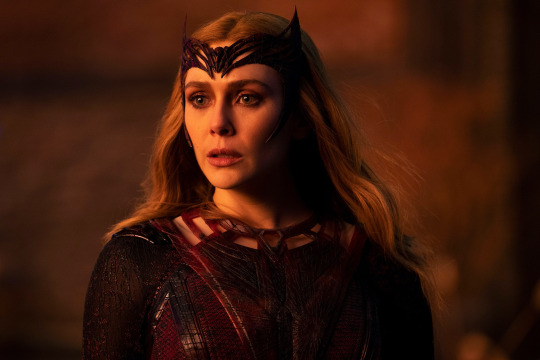
As you can see this one is a complete 180 compared to the other three lol. This pattern doesn't exactly have a name, so I just made one up.
Pretty much all INFP villains I've seen are driven by their emotions. Afterall, Fi is our dominant function. The emotional villain is driven by personal reasons and experiences, they're not just evil for the sake of being evil. Typically the emotional villain is very moody, disturbed, and/or unstable. They are usually the direct opposite of their other INFP counterparts: they are selfish, ruthless, and blood-hungry.
Examples of the emotional villain: Wanda Maximoff (MCU), Joker (2019 ver), and Kylo Ren (Star Wars).
5. The Angsty Teen
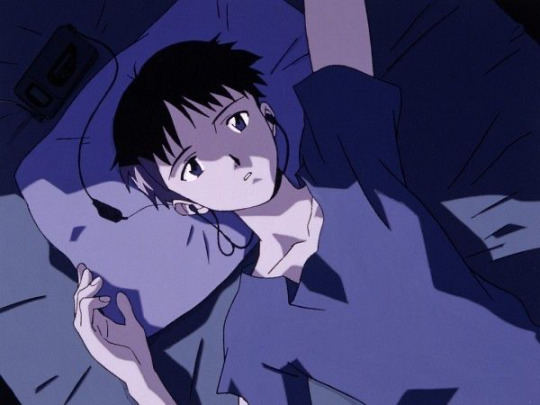
Another really common portrayal of INFPs in media is the angsty teen. This archetype is pretty self explanatory, an angsty hormonal teenager. The angsty teen often struggles with social anxiety, and/other another mental illness. They also might have trust issues, be really moody, or hurting from unrequited love or some other trauma. The angsty teen often copes through artistic means, like poetry or painting.
I feel the feelings on this archetype are very divided. While a lot of people don't like having that image as a representation of their type, some argue that it's a realistic portrayal of the darker side of being an INFP. I personally feel like the angsty teen represents my inner conflicts, while the dreamer, mediator, and seeker represent my outward behavior most of the time. What are your thoughts?
Examples of the angsty teen: Shinji Ikari (Evangelion), Will Byers (Stranger Things), Cassie Ainsworth (Skins), Kou Mabuchi (Blue Spring Ride), Violet Parr (The Incredibles), Nico di Angelo (Percy Jackson), Charlie Kelmeckis (The Perks of Being a Wallflower), Elio Perlman (Call Me By Your Name), Todd Anderson (Dead Poets Society), Fischl (Genshin Impact), Lydia Deetz (Beetlejuice) and Cry Baby (K-12)
There's plenty more archetypes but I thought I'd just focus on these 5. Also remember that these archetypes don't represent all INFPs as a whole, they’re just like "INFPs in a nutshell."
What are your thoughts? Which archetypes do you relate to? Which one's your favorite? Which one's your least favorite?
#infp personality#infp#mbti types#mbti personalities#mbti#myers briggs#fictionalinfps#fiction#media#mbtiblogfun#infp archetypes#infp relatable#infp media
201 notes
·
View notes
Text
charles and the wildbow protagonist
It is a known truth amongs the fandom that charles is what happens when you see a wildbow protagonist from the outside. charles fulfills all the requrements of the archetype to a T.
scrappy survivor with a never say die attitude, who will not stop no matter what. ruthlessly utilitarian mindset where whatever can be done in order to win has to be done, all other considerations be damned. the lowest kind of underdog where he is (literally in this case) hated by the universe. surpisingly resourceful and capable of wrenching a solution to any problem even when starting with every handicap and disadvantage possible. and most important of all: a cause. an all consuming goal. an almost fervent belief that they are doing what HAS to be done and that it is the CORRECT thing to do.
so with all that in mind is interesting that charles IS very much, an evil person. not just misunderstood. i dont think his villany is merely a product of what side of the narrative he was placed in. i dont think this is just protagonist bias. i think charles was unequivocally a monster, in a way that the other wildbow protagonists (with perhaps the exception of sy/simon??????? arguably???????) are not.
and what is it that sets him apart?
why is taylor going khepri and mindcontrolling the multiverse in order to defeat scieon still not something that sets taylor as an evil person in the same way that charles creating the crucible and trying to forswear the kennet girls in order to defeat the seal of solomon is
(quick aside to acknoledge that this is not a clean topic and is not as easy as to say that all wildbow protags are unquestionable good people or fighting for a good cause necessarily. blake is a preety cool guy but he does go boogieman and decides to just murder a bunch of guys, bad people for sure but he just kind of goes and does it all the same. vicky did contribute to the prison planet and a bunch of other stuff during ward and sylvester... is sylvester)
before i try to answer that question i do want to double back on the whole villany by narrative framing. wildbow, for as dark and grimm and bleak as his stories get, he always always always tells stories about good triumphing against evil. he has not told a story yet where the bad guys are not defeated and the good guys dont accomplish their goal. and so in the end the thing that sets charles apart from a wildbow protagonist. the thing that truly marks him as a villain, is not just the horrors that he commited, or the suffering he is gulty of or his evil deeds. is most of all the fact that he loses at the end what ultimatly proves him wrong.
because that is another thing wildbow has going on in his stories, his stories are ultimatly incredibly idealistic because there is a sense once you read them over and over, and its subtle and easy to miss but there all the same, that evil ultimatly always ends up losing. that evil is on some level self sabotaging, that goodness is the winning strategy. wildbow heroes win because they are scrappy and smart and tenacious and never give up, but most of all they win because they were kind, true and righteous, or at the least they had these qualities in enough quantities as to matter. that being a good person matters both in a fundamental sense but also in a strategic sense.
taylor could not have gotten to where she got if she hadnt been, fundamentally, ultimatly, a Good Person. someone who truly cared for others, who was capable of helping and nurturing and building. this is proven most starkly when her efforts to rebuild the city and to create a safe heaven for the citizens of brockton bay reward her with everyone siding with her on the caffeteria scene against dragon and defiant. (and then later when dragon and defiant get on her side after she kills alexandria).
Blake ultimatly won because he was honorable and true, because even though the universe was against him he tried to leave the world a better place wherever he went, because he made an effort to save evan from the hyena, and green eyes from the abyss, and get rid of Ur, and because he was fighting against deontological evil which meant that he was going to get help and support form others.
vicky won because of the goodness that she spread, because of the ways in which he made her team stronger, because of how she saved kenzie from a terrible family situation and how she made a good impression on that girl on the train and because of how she helped ashley get to a better place and by how she sent all those people to the prison planet, wait, no hold on, forget that last one. because her and every hero made a true effort of goodwill for the non powered people.
sylvester... again, was sylvester.
most important of all, they cared for others, they loved and were loved by others. taylor did have lisa, and bitch, and Imp and dragon and many others who truly believed in her by the very end, no matter how monstrous she got. blake had evan and green eyes. sy had the lambs, and the beetle students, and the experiments, etc. vicky had breakthrough.
who the fuck did charles have? the aurum? the st victor kids and teachers? maricia??? fucking the kim famly???¿'¿¿?¿??? wildbow made a clear point of how these people barely tolerated one another and how it was misserable to be among them.
charles had noone that cared for him, because he didnt bother to truly care about anyone. he was never kind, he never had a moment of tenderness, he never built or made anyone stronger in anyway that truly mattered. or if he had they werent enough to matter and they were all corrupted by everything else he did.
the one thing that keeps him from being a true wildbow protagonist is that, ultimatly, he was kind of a piece shit.
58 notes
·
View notes
Text
Big Boss: What Happened?
Big Boss: Info Dump Request
@qoppybirdie requested:

This is my attempt at fulfilling that, with my own take on it. And probably a whole lot longer than OP wanted. But here we are.
Google Doc version. NOW ACCEESIBLE (Opened Access)
As a quick aside, I personally consider Portable Ops canon to the timeline and lore. Not everyone does, but in this I will be using examples from Portable Ops, as to me, it’s canon. I’m aware this is debated, so I’m putting it out there first and foremost.
Here we go!
“Politics are a living thing. They change along with the times. Today’s good may be tomorrow's evil.”-The Boss, to Big Boss (then Naked Snake) during the Virtuous Mission, 1964.
Big Boss, known as John/Jack, was born in the USA in 1935. Almost nothing of his life is known until the age of 15/16, when he met The Boss in 1950, becoming her apprentice. The Boss served as his mentor, and remains one of the most defining figures in his life, up until his death in 2014. Soon after meeting The Boss, John fought in the Korean War, and was part of nuclear testing in Bikini Atoll, in 1954.
This puts the FOX unit in jeopardy, and at risk of execution unless they can prove America wasn’t involved, with Big Boss given the task of rescuing Dr. Sokolov for a second time, assassinating the Boss, and as they put it “if possible, Colonel Volgin”. Volgin happens to have a metal gear, but that’s secondary to this story believe it or not.
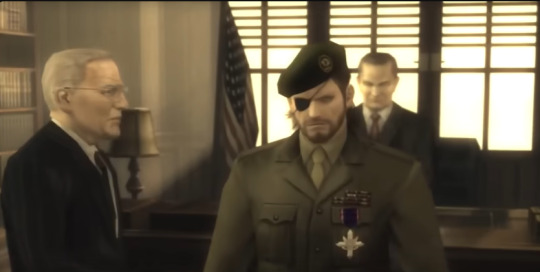
This is the Operation where he also meets Ocelot, and Eva. Both of whom we’ll get back to later.
Cue Operation Snake Eater, and what is arguably the start of a nearly 60 year downfall for Big Boss. Big Boss defeats the Shagohod Metal Gear and Volgin, (does not manage to save Sokolov) and kills The Boss. When he returns to the United States, he’s given a medal for his service, and is left with a feeling of emptiness, grief and a whole lot of unanswered questions.
Whenever I think about the spiral of Big Boss, I tend to come back to the moment here, (and the one later, when he’s at the Boss’ grave). It can be argued that he never, ever recovers from this. While it takes him a lifetime to understand it, by the time of his death in 2014,he has fallen so far from the man he once was that it’s only at death he can acknowledge what he’s become, to his clone son Solid Snake,(Dave).
“Boss, you only need one Snake now..no, the world would be better without Snake’s.” Big Boss (at the Boss’ grave to Solid Snake, in 2014)

I could almost end this here, on the notion that he was used by the military to kill someone he loved and cared about, and lost all sense of what he believed in, and himself, in doing so. That the next 60ish years are just him going through the motions, attempting to come to a conclusion that doesn’t exist.
Why was he used? Why was he the one that needed to pull the trigger? Big Boss wasn’t exactly what I’d call an ‘idealist’ before that, but he did hold certain preconceived beliefs about his place in the world, and what he was meant to do with it. And that he had all of them wiped aside in an instant, all to save face for a country that would discard him at a moment's notice.
Before she was assassinated, the Boss was legendary as a soldier, and an American. She was idolised by her country and the people she served and worked with. When we find out later that her defection was part of a mission, and that it was jeopardised by Volgin behaving in a way nobody saw coming, it took nothing for them to discard her. When Big Boss is being awarded a service medal and the president attempts to shake his hand, I can imagine those are the thoughts playing on loop in his head.
They honour him now, in the moment. Yet a week before he was almost going to be executed by that same government and country, and his mentor, someone so beloved by the USA, was given that exact fate
He realizes here that his role, his personhood means nothing in the greater scope of war, and he’s supposed to just stand there, accept a handshake and pretend this total farce is a good thing?
Just like she told him, “Today's enemy, tomorrow’s friend.” That was a lesson the Boss understood before he did, and it’s one that he grasps all too well afterwards..to a degree. Big Boss we come to see is betrayed again and again by the people around him, because up to a certain point, he allows people into his life. In the same need for human connection and meaning all people have. Something that is abused countless times by the people close to him.
It takes years, but at some point, he does eventually give up. As we’ll see.
Following Operation Snake Eater, Big Boss leaves the military for a bit. He works at various jobs like hunting guides, only to go back to fighting and meet and rescue Frank Jaeger during the Mozambican War of Independence in 1966, but ultimately ends up doing mercenary work. In 1970, he’s captured via drugging by another rogue FOX unit, headed by a rogue agent known as GENE in what became the San Hieronymo Incident.
Gene had an idea, a nation of soldier’s. Made by soldier’s for soldiers.

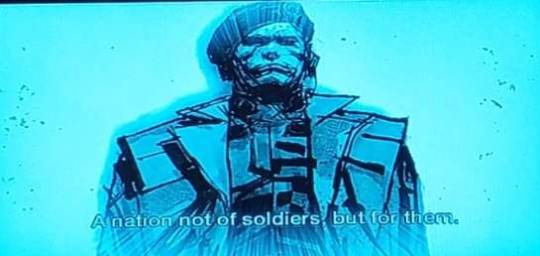
This will sound extremely familiar, as it is almost verbatim to what Big Boss ends up creating himself later on. Outer Heaven. Even though the San Hieronymo Incident ends in Gene’s defeat, and with Big Boss returning to the USA and forming The Patriots with his former commander, Major Zero and members of the unit in Operation Snake Eater. Such as SIGINT (Donald Anderson), Para-Medic, Ocelot and Eva. Using some of the Philosopher’s Legacy, (money), The Patriots started out as an attempt to unify the world, but expanded and corrupted far beyond that original goal.
Big Boss himself leaves the Patriots in 1972, after facing the second major betrayal via the creation of Les Enfants Terribles (aka, ‘The Terrible Children), under Para-Medic’s care. Without telling Big Boss, or asking his consent, LET was undergone using Big Boss’ DNA, with an unnamed egg donor and Eva as the surrogate to make his clone sons, Solid Snake and Liquid Snake (Eli). As well as the ‘perfect clone’ Solidus Snake, (George). (He was not surrogated by Eva, however).
“They’re no sons of mine.” “Just a bunch of cells grown in a lab?”
“What they are is much sicker than that.”- John and Ocelot discussing the clone sons, in 1984.
LET existed because Zero and Para-Medic wanted to ensure the continuation of Big Boss’ genes and soldier capabilities. He saw them as an abomination and betrayal. After learning of LET, Big Boss leaves the Patriots, and the United States. Working again as a mercenary for higher.
No matter what he does, he cannot get himself out of warzones.
“The Boss and I may have gone down different paths, but we were trapped in the same cage.”- Big Boss to Solid Snake, in 2014
Really quick, the definition of a mercenary according to Merriam Webster is; ‘one that serves merely for wages’. They mostly find themselves in warzones, but they are not fighting on behalf of a country. They are not conscripted or drafted. The gain is purely financial. But most specifically, a mercenary is hired ‘for foreign conflicts’ in particular. This is largely because a country may want to get involved in a certain conflict, or mission, but are unable to legally, or without raising suspicions. Thus, they hire a non-related mercenary, for pay, to do what they cannot.
This is the sort of environment Big Boss finds himself operating in more often than not. He’s fresh off a second betrayal, mistrustful and hurt, and finds himself on the lam and a gun for hire in Columbia, eventually ending up hired by the Colombian government to work with their army. I can imagine his attitude in Columbia being one that is grieving, disillusioned and bitter. It’s here that he comes upon a guerilla squad commanded by Kazuhira Miller, and wipes them out. Except for Miller. Who he ‘recruits’ under the idea of it being non-negotiable. Kaz is the only survivor, and if he doesn’t stay with Big Boss, he’ll be executed. (Instead, Big Boss blackmails a commander who could be responsible for it, in order to keep Kaz off the chopping block). Which is a nice little fact to hang over Kaz’s head, should he choose to escape.
Heiwa to Kazuhira no Blues (the Peace Walker audio drama) expands on this a great deal. His ‘recruitment’ is no simple thing, and Big Boss also puts Kaz through a number of rigged trials he knows Kaz can’t win, in order to further cement his place under him. Combining that in conjunction with the fact that Kaz will be executed should he not ally with Big Boss (and I’ll point out here that yes, Kaz does try to blow himself and Big Boss up with a grenade but does he really want to die?) it’s something of a hopeless situation and somewhat one-sided.
The entire relationship and scenario with Kaz is complicated enough on its own. Kaz isn’t a fully innocent victim either, but it is at this point and time that one can see a significant shift happening in Big Boss’ mindset. There’s a sinister element to the trials he puts Kaz through, and yet, there’s still a part of him that clings to the idea of companionship. He’s edging closer to the dark end of grey in his climbing scale, but he has not yet crossed that point.

Kaz spearfishing during one of the trials (art by Yoji Shinkawa)
Defeated, Kaz joins Big Boss, and as his subcommander they form one of the first ever PMC’s (or, Private Military Company)-Militaires Sans Frontières (Army without Borders, or MSF). The concept of the PMC later takes over in the world (and the disastrous environment Solid Snake finds himself dealing with come 2014). While in MSF, Big Boss finds himself in Costa Rica to deal with the Peace Walker incident, and becomes allied there with some revolutionaries from the Sandinista National Liberation Front, who are under the command of Amanda Valenciano Libre, after the death of her father (the original commander). And via Amanda, Big Boss meets her brother, Ricardo Valenciano Libre, or. Chico.
Chico is where this gets complicated. Chico is around 12 years old at the time, and one of the key elements to where we see Big Boss’ mindset shifting fully. While he’s still somewhat optimistic, even a little goofy at times (the way we see him in Snake Eater), Chico’s situation is a mixed bag. On the one hand, it’s easy to argue that Chico being part of the MSF is one of the only alternatives he could have at the time. He’s in the middle of a warzone with his sister. If he’s not under Big Boss, where else can he go? What else can he reasonably do?
-What makes discussing Big Boss so tricky, I think-and why I believe it’s almost impossible to say he had some sort of ‘turning point’, is that it is completely possible to look at everything he does, everything that happens, and find a way to excuse or come up with a justification, or even logic for it. This is not me saying that he is right, or a good person. Metal Gear cannot just be boxed into ‘good’ or ‘evil’ it is grey. It is supposed to be grey. It centres around people and themes that do not have such simplistic barriers to work with. That is the point.-
-The downfall of Big Boss does not happen overnight. It is a slow burning wreck that expands and grows. It is the make-up and conclusion of many factors, incidents and events. It happens slowly, and sometimes it happens below the surface.-
For all intents and purposes, Chico is a child soldier. But is that Big Boss’ fault? Children are as wrapped up in war as any other. War does not care if you’re a child, or an adult. Did Chico truly have anywhere else to go?
I don’t really have an answer to that. And I’m going to admit it out right. What I will say is that early on in Chico’s recruitment, Big Boss rescues Chico, but he doesn’t want to go back with him because he’s ashamed of giving up information (link should be time stamped for access) about the others to the enemy.
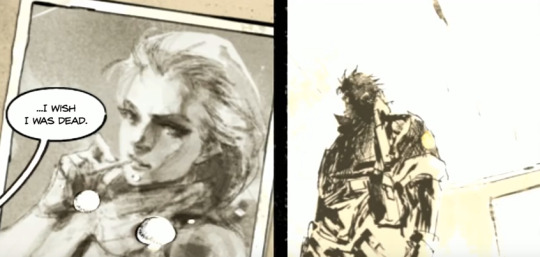

There are MANY ways to interpret this moment. I’ve seen various interpretations of it myself, but here’s how I’m going to explain it. As per how I see it. Again, this is a complicated story and scenario-and people’s view on it is going to differ a lot. One of the points I really want to stress in this far-too-long essay here is that none of what we see comes with the easiest answers. It’s all layered. How you view a moment may differ from how someone else views it.
Anyway, to me, I’m going to put it like this. Big Boss knows that Chico doesn’t mean that. What I can’t say for sure is if he’d have really shot him or not (I don’t think he would’ve, not only because he promised Amanda he’d bring Chico back, and if nothing else Big Boss will usually complete his missions. But that as far as we know, he never outright executes a child in the series). But Chico does not know this. Big Boss is, essentially, showing Chico that no, he doesn't want to die, come on now. And that breaking under the situation isn’t something he needs to feel guilty about. Nor, is it worth dying for.
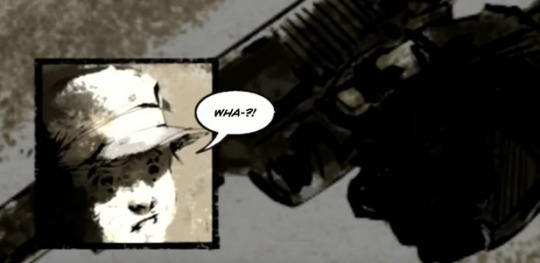
WE can assume that Big Boss isn’t going to hurt him. WE can realise that but there is no way for Chico to hold the same understanding here.
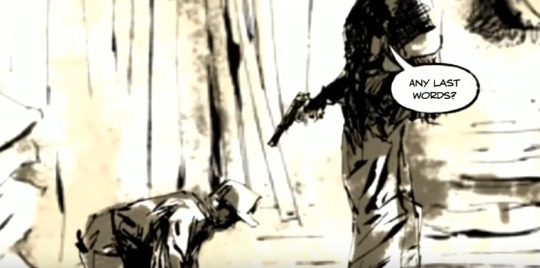

But Chico isn’t a man. Chico is a child. When Chico dies in 1975, Skullface says something very similar. Negating the fact that at the end of the day, this is no adult.
“No more wargames, you’re a real man now, soldier”.-Skullface (to Chico when he’s a tortured prisoner in Camp Omega, 1975)
Here, Big Boss is visibly (I can assume anyway) attempting to encourage Chico. Prove to him that he doesn’t want to die, and that he doesn’t need to die for the infraction he believes himself to have made. (None of Chico’s compatriots blame him for giving up information, and why would they? He is a kid).


But did he? Big Boss can think that the ‘child’ died, and he became a man. But is any of that really true? Is Chico not as much a child now as he is when he dies a year later?
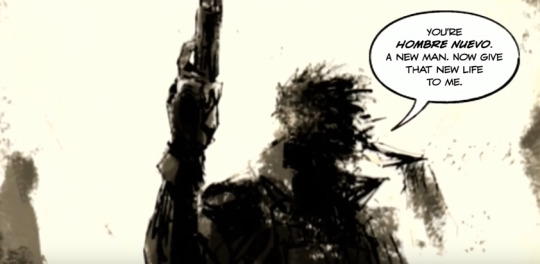
I find it very significant that the artist, Ashley Wood, has Big Boss completely in shadow here. It says a lot about what Chico must be feeling, and how we (the audience) might be meant to interpret him. There is none of the silly dork we know Big Boss to have been a decade prior. There is none of the innocence and even almost child-like awkwardness he was so beholden to. So much of his optimism, his original outlook and hope, is eradicated by this point.
Chico, I’ll note really quick is never seen off-radio. He is kept ‘safe’ (if you can call it that) on the MSF base itself. And working as radio support. I’ll note too that Chico always wants to be seen as an ‘adult’ by the people around him. But, come on. I’m sure we all remember being 13. I’m sure everyone had that ‘I am desperate to be mature and taken seriously’ awkward teen phase. That doesn’t change the fact that he’s still a child, who is stealing Amanda’s cigarettes one moment, and laughing about his favourite monsters and cryptids the next.
It’s no more justified (in my opinion) than Huey Emmerich is when he uses the absolutely pathetic reasoning behind letting a 4-year-old Hal pilot Sahelanthropus.
“He (Hal) wanted to get in!”-Huey Emmerich to Revolver Ocelot under torture. 1984.
What Hal may have wanted is irrelevant to the fact that you don’t let a kid touch a hot stove because they want to. It is on the adults around them to make sure they don’t do things they can’t control. Granted, Chico is old enough in Peace Walker to have very valid feelings about what he might want, and more than old enough for personal agency, but still young enough to where adults around him should be protecting him.
And I know that in war, the rules are not the same. I understand that. Later on we see a 12 year old Liquid Snake and child soldiers in situations no child should be in, but does that mean they still didn’t need protection? In any case, I’m too close to getting off topic here, so let’s keep going.
We will see him goofing off a bit more in Peace Walker. But it is important to note that by its end, Big Boss’ ideology, and his view on the world has shifted a lot.
He also comes to find out that Kaz was employed by Zero (now going by ‘Cipher’) and working as a spy. Marking the third time Big Boss is betrayed by someone close to him. In this, I’m sort of torn. My personal interpretation of the ‘spy Kaz’ bit is extensive and doesn’t quite belong here, but I’ll note that it’s another way in which Big Boss comes to find that he can’t trust anyone that it doesn’t matter how close someone is to him, they are going to find a way to stab him in the back.
He’s already become more and more cynical around this point, and it is not aided by finding out the truth about Kaz either. The cloud around Big Boss darkens all the more.
By the end of Peace Walker, Big Boss has come to learn what he thinks is the truth about the Boss. When she put down her gun (stopped fighting) she (in his mind) betrayed the ideology and beliefs that he feels she taught him, and when Big Boss ‘let’s go’ of her (in disgust, as he takes this to be an example of her betraying the will of the soldier, and him). I don’t fully grasp how he comes to this conclusion, but in letting the Boss ‘go’ (by removing her bandana) he shifts again, willingly keeping a nuke on Mother Base in the MSF (at Kaz’s suggestion, I’ll note) To Big Boss, I guess he might see this as the fourth betrayal.
With another metal gear defeated, Big Boss declares the following to the MSF:
"We have no nation, no philosophy, no ideology. We go where we're needed, fighting not for country, not for government, but for ourselves. We need no reason to fight. We fight because we are needed. We will be the deterrent for those with no other recourse. We are soldiers without borders, our purpose defined by the era we live in."-Big Boss to the MSF, after the Metal Gear ZEKE battle.
But this is not where that speech ends. Big Boss is under few illusions about the sort of man he’s become, and he tells his men much the same.
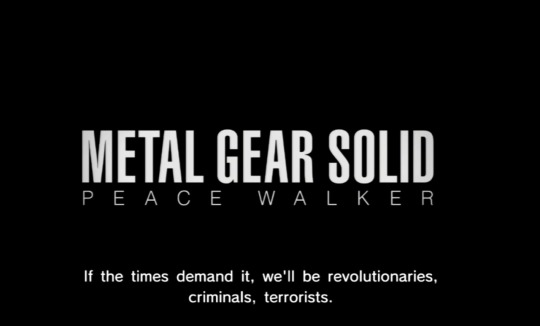
Fairly self explanatory, in my opinion.
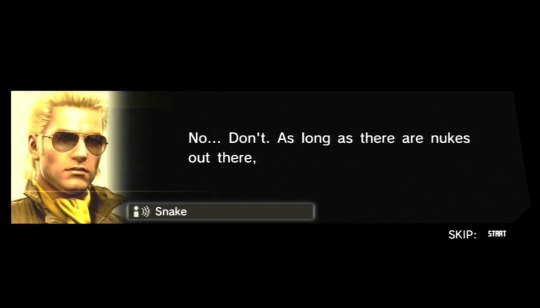

Thus, the MSF becomes a nuclear power. And this is the mindset that Big Boss has when he goes into the Ground Zeroes mission at Camp Omega. Chico has escaped to go rescue Paz and Skullface has planned an attack on Mother Base while they’re gone. The inspection approved by Huey Emmerich (who didn’t ask Big Boss or Kaz first, and was apparently under the belief it was legitimate..and I don’t know if it’s true or not, I can never fully come to a conclusion there).
The base explodes, and while Kaz is seething and raging, Big Boss is left so shell shocked all he can do is sit motionless while Kaz shakes him repeatedly. Attempting to get any sort of answer from him. Answers Big Boss doesn’t give, nor does he have. After all, it’s not his fault the base went up in flames. The end result is the death of Paz and Chico, and the start of a 9-year- coma for Big Boss.
And, for the medic on that chopper, whom Ocelot and Zero turn into Venom Snake. Big Boss’ phantom and living body-double. Fully hypnotized, brainwashed and made into another man, all without his consent.
The creation of Venom alone is gregarious enough, but Big Boss didn’t sign off on Venom. He was already made by the time he wakes up in 1984. But aside from a moment of protesting it, Big Boss embraces it. Allowing Venom to wake up in a hospital that’s largely blown to shreds and turned into a massacre under XOF (Skullface’s unit), all so he and Venom can escape under cover. Countless people die in that hospital, and Big Boss has become arrogant and callous enough to where it doesn’t matter to him.
Ocelot is also the only one aware of the truth. (Someone Big Boss doesn’t seem to mind having that right, since up to this point, and the rest of his life, Ocelot is one of the few people who doesn’t betray him). Kaz, by contrast, has been completely abandoned and cast aside by him. And not told about Venom being a different man (until later). Which has a real element of cruelty in it, in my opinion. Especially since it’s Venom who saves Kaz after he’s been a POW for a while. But that’s another post in it’s own way.
Big Boss wakes up a new man, with a new (stolen) identity, and with his body double firmly in place and Ocelot pleasantly self-hypnotized to carry it out, he leaves to go begin the formation of Outer Heaven. Free to let others do his dirty work, while he continues to operate by himself.

Putting aside the fact that he looks damn good here-that isn’t the face of a guy with a whole lot of humanity left in him.
Remember Zero? Let’s go back to him for a quick moment. Because it’s at this point in the timeline that Big Boss begins to embrace a concept that was originally propagated by Zero when they were still all working together as the Patriots. By the early 1970’s, Big Boss had a pretty good reputation behind him as legendary soldier. And Zero believed it would be a good call to emphasise that narrative. It was beneficial to have Big Boss’ legend spread throughout, and continued. It’s also important to note that Big Boss himself rejected being called ‘Big Boss’ as he believed the title should only belong to the Boss.
In San Hieronymo, he’s called ‘Snake’ (much like his original codename, Naked Snake) and in Peace Walker the sandinistas often call him ‘Vic Boss’ as they compare him to Che Guevara (as does Kaz). The comparisons to Guevara do not end there, as historically, Guevara was most known for having several jobs under his belt, and being a key figure in the Cuban Revolution. Until his execution by the CIA in 1965. Personal opinions of Guevara are extensive and far beyond the scope of what I’m going to cover here, and will undoubtedly vary by person. Thus, I’ve left it as a link. He was a radical revolutionary in his lifetime, and is mentioned periodically in conjunction with Naked Snake, which paints a suggested idea of how some characters in-series viewed Big Boss as a person.
This being a good or bad thing, is again up to personal interpretation.
Either way, it’s notable (for me and I guess for the purpose of this essay) that up until the end of Peace Walker, Big Boss largely rejects the idea of being a figurehead, a martyr or particularly legendary. That is no longer the case in the 80’s. Where he is fully ‘Big Boss’ as we know him, and absolutely fine with leaving people in the line of fire (consent or otherwise) after a long coma, one too many betrayals, and the full disillusionment of his original beliefs at the hands of a lot of hurt, and years of pain and complicated warfare.
I don’t know that I’d consider Big Boss was ever a ‘humble’ sort of man. In the very beginning of his first mission we see him doing (the Halo Jump into the Virtuous Mission) he’s arrogantly smoking and ignoring the man telling him to put on his mask. But by the end of the 80’s he’s gone completely into the beast he and others created, arrogant and without care.
While Venom is working on the Diamond Dogs (who are also later transferred to Outer Heaven, while Big Boss himself operates Foxhound), he’s (at some point) reuniting with Frank Jaeger (now Gray Fox, at some point rescues and recruits Sniper Wolf, and building up Zanzibarland). By the 1990’s, Big Boss is kidnapping scientists, building metal gears, has children he saved on his base, and is nothing like the man we saw in the mid 60’s.
Hey, speaking of kidnapping, let’s go over how soldiers get ‘recruited’ to the MSF, Diamond Dogs (again yes I know that’s Venom), Outer Heaven, etc. Starting with the MSF, (but there was a taste of it in the San Hieronymo Incident), soldiers are knocked out and dragged back to the base. They’re left in the brig for a little bit, and come out completely and utterly loyal to Big Boss.
How loyal?
“We live and die by your order, Boss!”-Diamond Dogs infected with the Vocal Cord Parasite mutation, just before being mercy executed by Venom Snake.
That loyal.(Again, it’s best to operate when talking about Venom Snake in this specific case as if he and Big Boss are one in the same, because it’s not exactly about the man, but the situation, the cult for lack of a better word, of Big Boss). To these soldiers, who they are as people doesn’t matter as much as what the Boss demands. It’s that same energy, that mindset, that had Venom Snake (then the Medic) throw himself in front of a flaming chopper to save Big Boss’ life.
And where Big Boss might’ve questioned that sort of thing beforehand, by the time of Diamond Dogs, Outer Heaven etc, it is fully embraced. It’s fine that he’s got another man doing plenty of his dirty work (without his consent). It’s fine that he left Kaz because Kaz hurt him and betrayed him and he doesn’t deserve to hear otherwise. It’s fine that thousands die in a burning hospital to save his own life.
And then it’s later ‘fine’ when a young Solid Snake (who doesn’t know he’s Big Boss’ son) is sent into Outer Heaven during Operation Intrude N313, to kill who he thinks is Big Boss, but is actually Venom Snake.
Venom Snake, who has now spent 11 years as Big Boss himself, who has one last mission to die. As Big Boss for Big Boss. Again. The tape to Venom is Big Boss at what I believe is one of his most arrogant moments yet. In it, he thanks Venom *sort of* for his work, and how he’s helped him build up their shared legend. A legend that later Big Boss takes all the credit for. Because Outer Heaven explodes, and the man is all but erased from memory. Absorbed back into Big Boss yet again.
For a man that wanted to create a nation where soldiers mean something, and are revered, Venom’s discarded pretty quick (and he never agreed to be there to begin with). I cannot say if the Medic would’ve agreed to become Big Boss if he’d even been able to, but I can say that it is hard to deny that he’s used as much as any other soldier. Because at this moment, Big Boss now believes that dying on a battlefield is the only way to go, and Venom should be honoured to be him. Or ‘them’ as Big Boss puts it.
“I am you, and you are me.This story, this legend, it’s ours. I cheated death thanks to you.”-Big Boss to Venom Snake.
And then Venom dies, all but forgotten. His purpose has been served. His job is done. He’s no longer needed. Him, nor any of the soldiers who die in Outer Heaven. With Solid mostly oblivious to the secondary layers happening below. (Big Boss has absolutely no issue using Solid, either. He’s past the point of caring). I can imagine someone telling Solid, “This guy used to laugh about eating glowing mushrooms that recharge his batteries” and being unable to believe it.
When Solid Snake faces down Big Boss for the second time in 1999, he is past the point of caring about anything that isn’t war. His speech to Solid in Zanzibarland before Solid defeats him is infamous, and sums up his general view of the world in a nice, succinct fashion for Solid (and the audience).

This is the culmination of decades of hurt, betrayals and the knowledge that he is a man built and bred for the war machine. Big Boss has come to a point where he’s suffered enough, experienced enough, that war is all he can understand. War is all that he can possibly care about. He has stopped being able to feel, to connect with people. He is hollowed out, hardened and fully embracing the man he’s turned himself into.
These are not excuses. Big Boss can be a victim of his fate and the war machine, and still not be in the right here. The two can and in this case I’d argue, do very much co-exist. As I said above, his ‘downfall’ was not a matter of tripping down some steps. It was a slow, consistent decline that eventually accumulated. Despite this, Solid does defeat him, and Big Boss is put in stasis for the next few years. Left quite literally on ice. Conscious, but trapped in his body.
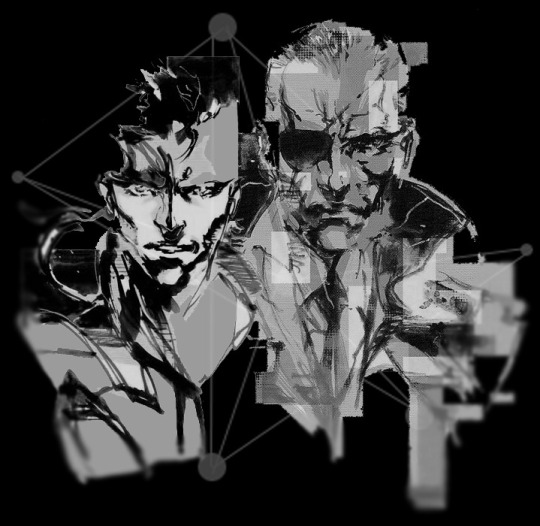
Don’t YOU make your clone son kill your body double and use him almost as badly as others used you? No? (Solid Snake and Big Boss, Metal Gear Solid 2, Yoji Shinkawa)
“I never saw you as a son. But as a man, a soldier.”-Big Boss to Solid Snake, 2014
We know how this story ends. Big Boss spends a bunch of time on ice, gets re-fitted with body parts taken from Solidus’ and dies of the new Foxdie virus (which also kills Eva and Ocelot, just like it did Liquid before) in the same cemetery where most of it started. Leaning up against the Boss’ grave. Aware that he spent decades misunderstanding her will, and that he never quite got it right in life.
How then, would I wrap this up? Well, I guess you could say that I’ve cheated a little. Because I never truly answer the question, “how does Big Boss become evil”, did I? I suppose some of it’s because, as I summed up earlier, I just don’t see it as such a simple case. I do believe that we’re all meant to have our own interpretation, at the end of the day, and the easiest way to summarise it might be that a man becomes so enmeshed in the war machine, that he turns into the very machine himself.
Big Boss had child soldiers (but did the kids fight?). Big Boss used, and abused many people (and was used and abused himself). Big Boss created PMC’s (with help). Big Boss had nukes (at the suggestion of others).
Etc, etc.
At the end of the day, I’ll conclude this long, rambling spiral of thoughts to say that the moment Big Boss ‘turns’ is up to interpretation. Which may seem like a cowards way out, but is it not true? Whenever I pose the question, I see many different answers and responses out in the wild.
This, therefore, is my own take on it. My attempt. And I know I’ve probably forgotten something (or many something’s) but I personally, will end here.
If you made it this far, congratulations! I cannot believe how long this got, and thanks for coming along with me.
By,
Nate
#big boss#character posts: big boss#mgs#request posts#user: qoppybirdie#thoughts posts#nates headcanons#this is 23 pages long send HELP#i knew id ramble but CHRIST#anyway i feel slightly mad but hey least my uni skills go somewhere fun
46 notes
·
View notes
Note
oh geez kakashi of the roleswap au is rin?? That's why Obito stabbed him bc he got the sanbi and then they thought he was dead but he was in akatsuki- is this anything am i crazy (if this is spoilers then you don't have to answer but) WOW if I'm right this is really big brain roleswap, bigger brained than what i already glimpsed of this 😍😍😍😍
I don't want to say everything, partly because it's not very definite and set in stone for me, and partly to preserve some of the mystery (Also partly because you guys have such good ideas, I wasn't planning on keeping her alive before you guys made me think about it jkasldf) .
Once you decide that Kakashi just doesn't have the right kind of crazy to do the shit canon!Obito does, and that we need to dedicate the story to women's wrongs, the roleswap gets really hard. Because a) Rin has no character. and b) there's no third person to swap with Rin. It ended up becoming a sort of shell game, where Obito's role got split up and Rin ended up adopting some other roles from other characters. Lots of room for creative freedom. Maybe the essential evil of the story can be a girl who saw the world fail the people she cared about, and decided to rewrite the world to create a safe place for the people she loved. In Naruto, it takes a very kind and loving person to be a genocidal megalomaniac.
Kakashi, meanwhile, is somebody most marked by his loyalty. His love is less idealistic and large, and more cynical and gritty. I connect him to Konan: somebody who follows the dreams of the person they love, and who makes the dreams happen. Yes he is absolutely just fucking around in the Akatsuki, being a lazy bum and annoying Kakuzu and Hidan to death. Yes he is Rin's personal assassin and shadow monster. He has layers. To me, he's a somewhat-comedic loyal goon/wifeguy who loves his partner-in-crime/world peace and who sometimes enters a dissociative state and commits atrocities. What, is that a crime all of a sudden.
The Ame 3 ended up being a big part of the swap, and a lot of the swap ended up happening between Rin & Nagato and Kakashi & Konan. Yahiko, this is YOUR hero academia! The Akatsuki are NOT a terrorist organization! They're nice guys! Look, Deidara and Sasori are artists, they're respectable - okay, Hidan and Kakuzu aren't respectable, why are they in our peace loving organization - why do our political enemies keep dying - Konan, what do you mean 'don't worry about it' -
#yahiko you adopted too many nutjobs in your found family and the inmates are running the asylum#my writing#my asks#i've always been super intrigued by yahiko and utopia got me feeling a lot of ways about the ame 3#theyre really load bearing an exemplar of the Themes and Points#the whole time ive wanted to write yahiko i want to write a lovable good natured guy whose just surrounded by freakas (konan and rin)#i support women's wrongs etc#feminism.
15 notes
·
View notes
Note
Missing Ollie so these are for him ❤️
Eros 4, Philia 3, Agape 2, Philautia 2
Eros 4: Do they believe in love at first sight? Have they ever developed a crush or romantic (or erotic) fixation upon a stranger based on their appearance alone?
i think oleander is absolutely the kind of person who believes in love at first sight, that very romantic and twisted-idealistic worldview is kinda the perfect space for that i think lmao. it’s not necessarily that you have to know that it’s love immediately, aka how it was for him with camellia, but he felt that she was special and that she would play a special role in his life.
however based on appearance is a hard pass. his feelings for camellia were based on a sense of wanting to help her, fan the flames of her darkness and such.
Philia 3: What qualities does your OC most value in a friend? Loyalty? Shared sense of humour? Or something else?
ooh difficult one for oleander. it’s sort of that ‘if everyone is your friend, do you really have no friends at all?”thing, as in he views everyone as a friend, or as he would describe it, has love for everyone. so what qualities matter to him most? being alive (being able to rot)? i guess lol. like it’s certainly not an act and his friendship (on his side) is certainly not less strong than your average one, but he just genuinely and sincerely enjoys the company of everyone, if they love him or especially if they hate him.
Agape 2: Does your OC feel a spiritual connection to the world around them? Do they have a particular love for nature or living things?
absolutely! to all three of those! i think he’s the sort of person to view it all as one connected thing, not only a shared space but sort of. truly that everyone and everything is connected through string-like fate and love and whatever esoteric bullshit you can think of. but that connection to him is certainly the rot of body, mind and soul.
this and the answer above are actually why he acts so familiar and vulnerable with people he just met. you could know him for five seconds and he would treat you like an old friend he just hasn’t seen in 47 years lol. because again, not an act—to him, that’s exactly what it is.
Philautia 2: Does your OC believe that it is important to love themselves in the first instance? Perhaps in order to be able to give and receive love authentically? Or because they believe first and foremost in "looking after number one"?
well. another difficult one. no. this is actually the biggest problem he and camellia ever have in their relationship and the reason she eventually leaves him. i know calling someone an empath has sort of become a meme but if there’s one it’s ollie. what i’m trying to say is that he not only understands but especially feels for and with them so much, and yet, he does not understand why camellia does not want to kill him. he offers himself up to her/ makes countless promises of saving his death for her which makes her more uncomfortable as time goes on each time he does it and he just becomes more insistent on it as a result. he ultimately views himself as not only as disposable, but as something for which death through the right person/the ultimate evil he nourishes (camellia) would be the best end to ever be. if he doesn’t die like this his entire existence would be a waste. this is the guy who when he was a small malnourished kid barely surviving in the wilderness let parasites and other various animals eat away at him because he couldn’t bear it otherwise. he’s someone that fans the flames of evil and rot, the breeding ground of sin and malice, and when all his hatchlings are conceived and fully grown it would be his greatest honour to have them devour him.
but back to him and camellia—in the end with how much love he carries for others he could never make room for hers for him. he doesn’t understand why she doesn’t want to and desperately tries to keep herself from loving him the way he loves her. it’s why her biggest complaint about him is and always has been that he cares too much.
(ask game)
18 notes
·
View notes
Text
eiffel's problem is that he sees every injustice as an interpersonal issue. he doesn't understand how his flippancy or apparent leniency towards hilbert might look to hera; in his mind, it doesn't contradict his support for her. to eiffel, it seems obvious - he is also one of hilbert's victims, hera is his friend, of course he's completely on her side - but he fails to fully grasp how the stakes are different for her.
ep 19: "you need to stop treating this like a joke, officer eiffel." / "hey, i'm the person for whom the joke tolls." / "i get you're scared he put something inside you. but i hope you haven't forgotten emergency code alpha victor. he put that in me." and ep 51: "they're just jokes! they don't really mean anything." / "see, eiffel, you get to have that. they can be 'just jokes' for you because you're... well, you. but we don't get that."
the issue in shut up and listen is eiffel's repeated, if unintentional, microaggressions, but it's also his general use of dark humor as a coping mechanism - jokes he feels justified in making because of how the subjects of those jokes have impacted him. eiffel sincerely believes in treating people equally, but his idea of 'equal treatment' can be idealistic and naive. he has an awareness of interpersonal harm, but he's lived most of his life without ever being confronted with the reality of structural harm - being pre-judged and othered and having his life devalued on the basis of outside categorization.
but the thing about that is that it has happened to him, too. eiffel is an addict, and a convict, and marked as from a lower socioeconomic class than minkowski or lovelace, and those things are the reasons goddard futuristics was able to buy him as prison labor and - without his consent - consider him expendable for medical experimentation. none of that is a coincidence, but he doesn't see the systems at work, only his own actions and regrets. which he then equivocates to the worst actions of people who don't share his sense of morality or guilt.
eiffel's ability to recognize and bring out the humanity in the people around him is one of his best qualities, but... on the basis of his identity, he's been able to live a life where he conceptualizes himself as the default person, and that's been reinforced by the pop culture he loves so much. that's a massive blind spot. he assumes everyone navigates the world in a similar way, and so, on some level, he sees everyone around him as an extension of or a reflection of himself. if evil is always personal, then it can always be reasoned with.
#wolf 359#w359#doug eiffel#like. his answer for 'what is your worst quality?'#is a very tongue in cheek job interview answer: 'i empathize too much with others.' but from a certain angle...#i just think it's interesting. he has such believable faults and biases and assumptions about the world.#and the other thing is. eiffel's values are the show's values!! in some way he is also correct!!#but it's the line between diplomacy and centrism.#and the understanding that inaction is still an action that can hurt people. and that there's often not a right answer.#eiffel values the right things as far as the show is concerned#and as far as i'm concerned#but he lacks necessary perspective to really enact those values. decentering himself enough to really listen#while still keeping that personal focus.#i love that line where he says he's going to 'keep debugging his code' because it's so deferential like#'sorry for talking about you like this' and also 'i'm trying to see myself through your eyes.' means a lot to me.#and of course. the dear listeners literally reflecting eiffel while viewing him as the representative of humanity. there's something there#especially with the way eiffel externalizes both his good and bad qualities and projects them onto others#really good show. really good character writing. you know.
124 notes
·
View notes
Text
ive yet to really see anyone else point this out but i think fyodor is going to end up being one of the most gut-wrenchingly unstable and sympathetic (to ME atleast) characters in bsd. what i perceive as foreshadowing for this has all been pretty vague, but thats really only further ammunition considering the way asagiri likes to write via throwing the wildest shit at us out of nowhere at 50mph and expecting us to deal with it. how did i first come to this conclusion? harukawas eye thing
this is going to be long please proceed with caution if you read slowly or just not at literal supersonic speed. rant under cut u know how this works
for those unaware or who have since forgotten the exact details, here is the image explaining harukawas thing with eyes, click to read;

so. fyodors eyes are usually very light, which a few other people have pointed out is probably due to the fact he genuinely believes his goal of ridding the world of abilities is following gods will; almost everything he does is a necessary evil to acheive the idealistic dream of a world without abilities. he understands his actions are wrong, but you cant go through with a goal such as that without doing morally reprehensible things in the process. anws so as user wildflowerteas pointed out his eyes are extremely dark after hes resurrected

now, could this just be signifying that fyodor can now continue doing his fucked up little deeds via his functional immortality? yes. but asagiri doesnt seem to write that way and i need an excuse to defend fyodor because im insane
asagiri generally doesnt write characters, especially important ones, as subscribing to one specific side of the moral compass. sure, there are characters that are more morally good or bad or gray than others, but not every one of their actions is as such. characters arent straight heroes or villains in their actions, and sometimes not even narratively; fitzgerald did everything for his wife to finally be happy and see her daughter again, dazai still trained akutagawa the way he did despite knowing it was abusive because his circumstances couldnt allow him to change before oda died, et cetera
so, lets interpret it another way. fyodors eyes being dark after resurrection may not be a reflection of his sinister personality, but rather the way he views and experiences his own countless deaths. he is purified in death and tainted when hes brought back; at peace in his last moments and destroyed when hes alive again. so what conclusion did this realization bring me to? fyodor is a suicidal maniac and hates his ability hear me out Please
in hindsight it seems really obvious to me now; what other reason could have spurred him on to try to desperately to erase abilities if not because he himself despises his own? his ability is truly the purest act of cruelty someone can experience when driven to the point he has been; it lets him bask in the calm of death, the comfort of everything finally ending, the solace that hes going to be finally rewarded for his actions by god. but only for a moment. once that moment is over, hes torn back into the world of the living, in the body of his own killer, the corpse of his last vessel staring him in the face as if to mock him for what he could never have. it deprives him of the human right to even die. what kind of person who claims to love all humanity wouldnt want to free the world of abilities, if others' have caused them as much pain as his has to him?
okok i apologize for making u hear me wax poetic about an anime twink version of fyodor dostoevsky but if youre still not convinced, which is ok i can see why this would be very insane to someone who isnt obsessed with this guy, i want you to just imagine for a moment how living with that kind of power would effect you. while we dont know fyodors exact age, we can assume that hes been alive for at least about 500 years due to his ability. fyodor isnt some kind of immortal being that has a conveniently human form, he is an actual human being who was first murdered presumably just in his twenties based on his appearance, who then had to slowly come to the realization that he will experience small spots of death before having to continue the same cycle of immortality for forever. human beings cant grasp the concept of infinity; our brains arent wired to deal with the idea, because everything in our own lives comes to an end. fyodor will never experience that. even if you view him as plain evil, pure and simple, no human being wishes to have their brain broken by the hands of infinity. and yet thats what fyodor is experiencing
#something something repeated theming of dehumanization in bsd#bsd#bungou stray dogs#bungou gay dogs#fyodor dostoyevsky bsd#fyodor dostoevsky#sowwy spamming tags cause i have a lot of thoughts and i want people to tell me if im going insane or not#is there anything else i can add actually#bsd theories#? yeah that works
11 notes
·
View notes
Text
The amount of unexplored concepts in Zi-o is driving me insane but I can only tackle one thing per post so let's talk about Sougo for a minute
As someone who immediately clocked Sougo as having something off about him (to the point where I wrote day-one fanfiction about it), I was really expecting there to be a few episodes where we just. sat down and unpacked all of it. We didn't get that, but the crumbs we did get only solidify my opinion that Sougo is a really compelling character when you take the time to think about him.
On a surface level, Sougo is… very normal, I think. He's a cheerful guy, he's polite, he has a definite silly streak to him. He's kinda awkward, he fumbles around with Sento's catchphrase and struggles with his schoolwork. Like any good-natured protagonist, he has a drive to protect others and has no problem inconveniencing himself a bit to help someone out. These are all true things about him.
Sougo is also very good at manipulating people. And he does it by using his usual mannerisms to his advantage.
Take the episodes with Kuroto for instance. Sougo gets on Kuroto's side effortlessly by looking bright-eyed and enthusiastic about working with him, and this is completely believable to us as viewers because Sougo is always this enthusiastic. It's even relevant to his goal to become king - of course he would want to study under an actual king to get experience!

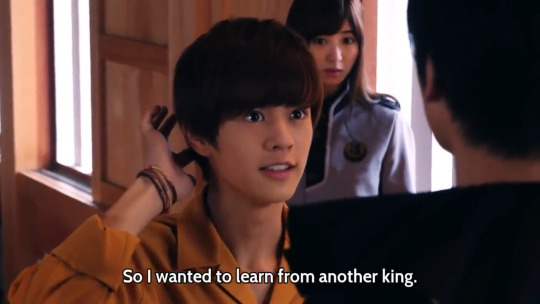
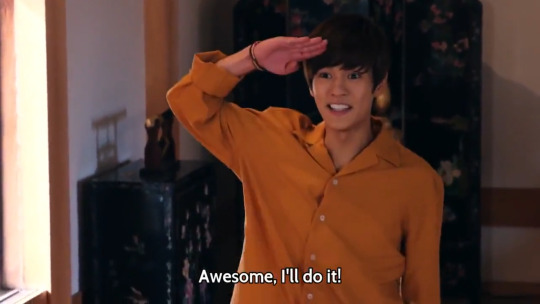
What makes this interesting is that it's only half true. Sougo isn't faking his enthusiasm, but he is faking his motivation. He doesn't want to work with Kuroto because he thinks he's cool, he wants to work with him because he wants to confirm if he's terrible first, and then take notes on how to not be terrible in the future.
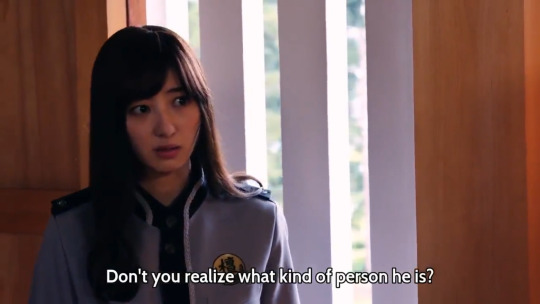

And this is what makes him so good at manipulation: he knows how to channel his behaviors in such a way that he always seems genuine. Of course, it probably helps that he's often only half-faking anyway, which makes it even more convincing.
He's also usually using this skill for a good cause, but when armed with the knowledge that he became evil in the original timeline, it suddenly puts him in a different light; one where you can go "oh, so that's where he's keeping all his supervillain potential."
He displays this cunning side to him in a lot of smaller instances - using Woz's dedication to him as a means to summon him at any time, getting Geiz and Tsukuyomi to hang out with him under the pretense of their mission to keep him from turning evil, so on and so forth.
They sneak this part of him into the script all the time, and the only person to really bring it up is, interestingly enough, his mirror world self.
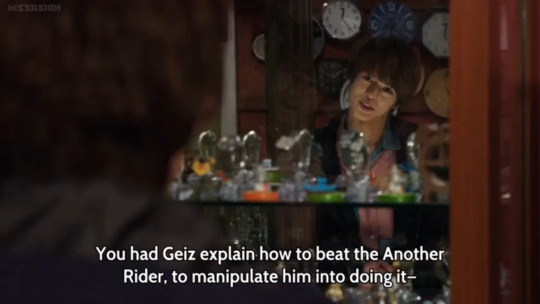
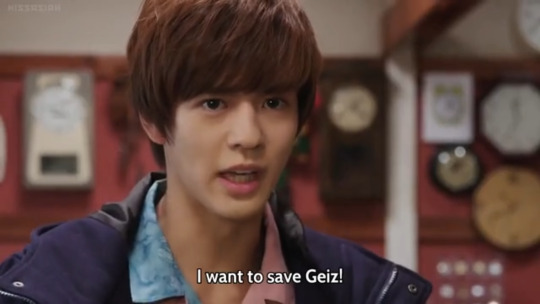

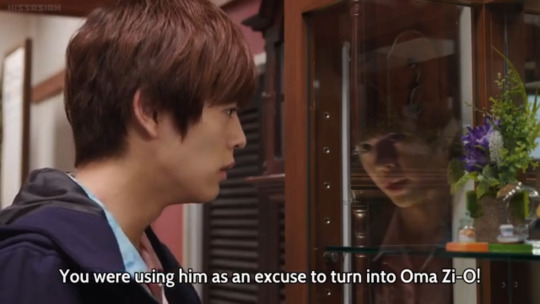

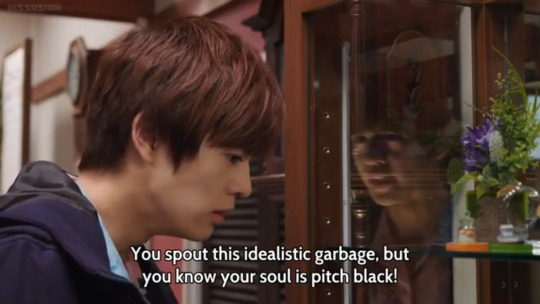
This scene makes me go nuts because it perfectly displays Sougo's inner conflict that he's usually really good at keeping under wraps. Though admittedly, they also make it a little unclear as to whether he was actually trying to manipulate anyone or just feels like he did anyway... but I think I've got it mostly figured out.
What's happening here, as I understand it, is that Sougo does genuinely want to save Geiz, but there is a small part of him that wants the power that comes with the Ryuga watch, too. And he does not like that part.
He knows that he's manipulated people before, and so when he notices having a second motivation here beyond his more idealistic one, he feels like he's manipulating people again. Making Tsukuyomi think that he's actually a good person when he just prompted Geiz to go sacrifice himself - he harbors a surprising amount of guilt.
And that's another key thing about Sougo that I haven't talked about yet: he hides things constantly.
Like, for example, why he wants to become king in the first place.
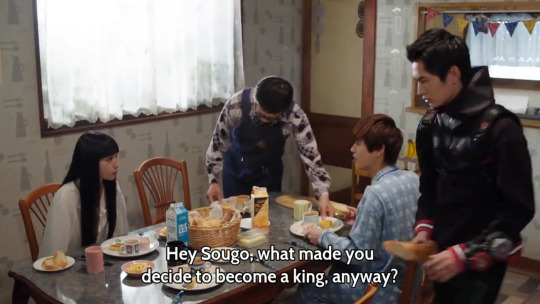
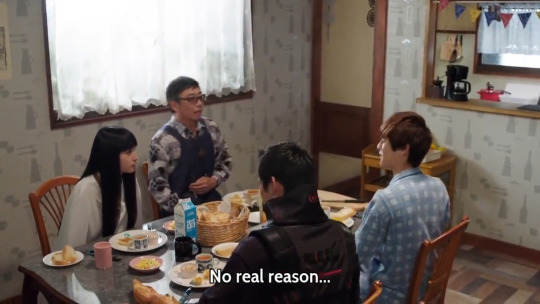
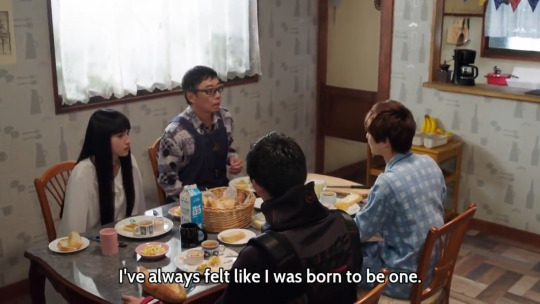
This is a lie. Sougo wants to become king because of a recurring dream depicting the most traumatic event of his life, where his only solace is someone telling him that he can save the world if he becomes a king.
But he insists in multiple episodes that it's just "something he's always known." He treats it very casually, despite it dramatically affecting his life plans.
Sougo treats most things with the same smiley nonchalance, honestly, in a way that can make him feel sort of detached from reality at times. But he takes things more seriously than it seems, and it's clear that he harbors a very deep sense of loneliness in him as well. Geiz and Tsukuyomi being his first real friends is one of the driving forces of the narrative, after all.
He also just drops lines like this sometimes that make me go crazy like hey has anyone checked on this guy emotionally during the entire show, I am Concerned
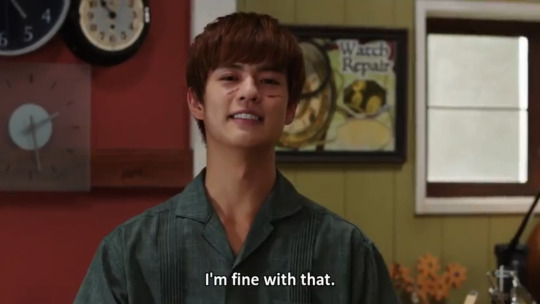
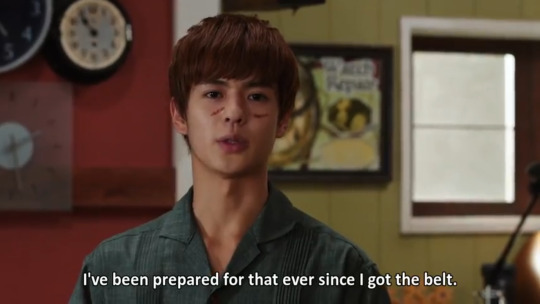
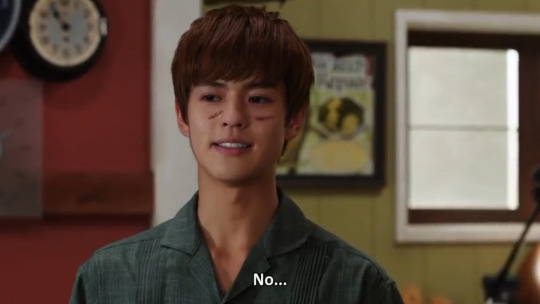

Like!! he says this about the possibility of him being the only person to not survive the final battle, and I know this isn't the first time he's expressed a similar sentiment and it's kind of a tradition for the protagonists of these shows to be like this but. god. and he says it while smiling
(You might be noticing a theme with Sougo and smiling through pain and you would be absolutely correct to do so)
I guess what I'm getting at with this whole post is that the appeal of Sougo's character, to me, is that he's just as much a silly, awkward guy with loads of enthusiasm as he is a cunning, clever person who knows how to lie to get the outcome he wants. He's both very cheerful and very sad on the inside, and none of these things are treated like they're in conflict with each other.
Sougo himself said it best:
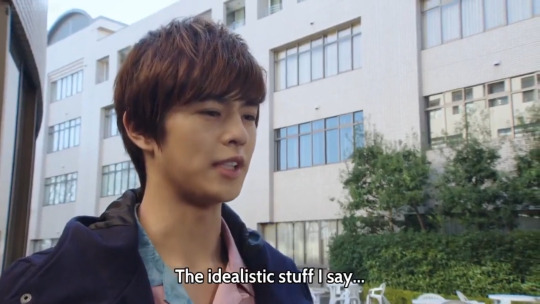
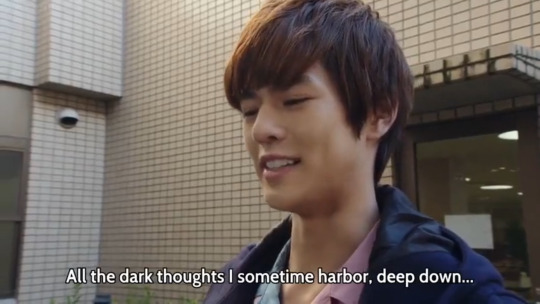

And I dunno, I just think that's a really cool way to write your main hero who's working against his destiny to become evil. Or just any character in general. I both completely believe him as a hero and also never quite got rid of that "off" feeling that made me compelled to write about him when the show first started.
Zi-o as a show missed a lot of opportunities to explore things deeper, and Sougo is definitely included in that, but it never failed to keep me interested in him as a character because something about his specific combination of personality traits makes him very compelling to watch.
(He also makes the other writing flaws that much more frustrating because he's way too good of a character for these scripts)
#kamen rider#kamen rider zi o#tokiwa sougo#analysis#meta#Long story short he's Kinda Weird and I love him for it
154 notes
·
View notes
Text
Spice Girls interviewed by Kathy Acker in 1997 for the Guardian Weekend edition.


All Girls Together by Kathy Acker
The Spice Girls are the biggest, brashest girlie group ever to have hit the British mainstream. Kathy Acker is an avant-garde American writer and academic. They met up in New York to swap notes – on boys, girls, politics. And what they really, really want.
Fifty-second street. West Side, New York City. Hell’s Kitchen – one of those areas into which no one would once have walked unless loaded. Guns or drugs or both. But now it has been gentrified: the beautiful people have won. A man in middle-aged-rocker uniform, tight black jeans and nondescript T-shirt, lets Nigel, the photographer, and me through the studio doorway then a chipmunk-sort-of-guy in shorts, with a Buddha tattooed on one of his arms, greets us warmly. This is Muff, the band’s publicity officer. We’re about to meet the Girls …
They are here to rehearse for an appearance on Saturday Night Live. Not only is this their first live TV performance, it’s also the first time they’ll be playing with what Mel C calls a “real band”. If the Girls are to have any longevity in the music industry, they will have to break into the American market and for this they will need the American media. Both the Girls and their record company believe that their appearance here tonight might do the trick.
There is a refusal among America’s music critics to take the Spice Girls seriously. The Rolling Stone review of Spice, their first album, refers to them as “attractive young things ... brought together by a manager with a marketing concept”. The main complaint, or explanation for disregard, is that they are a “manufactured band”. What can this mean in a society of McDonald’s, Coca-Cola and En Vogue? However, an email from a Spice fan mentions that, even though he loves the girls, he detects a “couple of stereotypes surrounding women in the band’s general image. The brunette is the woman every man wants to date. Perfect for an adventure on a midnight train, or to hire as your mistress-secretary. The blonde is the woman you take home to mother, whereas the redhead is the wild woman, the woman-with-lots-of-evil-powers.” So who are these Girls? And how political is their notorious “Girl Power”?
Even though I have seen many of their videos and photos, as soon as I’m in front of these women, I am struck by how they look far more remarkable than I had expected, even though Mel C is trying not to look as lovely as she is. I had intended to say something else, but instead I find myself asking them: “If paradise existed, what would it look like?” Geri speaks first, and she is, I think, reprimanding me for being idealistic. “Money makes the world what it is today,” she says, almost before I have time to think about my sudden outburst, “a world infested with evil. All sorts of wars are going on at the moment. Everyone’s kind of bickering, wanting to better themselves because their next-door neighbour’s got a better lawn. That kind of thing.”
“Greed,” Victoria adds.
Mel C: “Instead of trying to be better than someone else, you have to try to better yourself.”
In a few minutes, they are explaining to me that the Spice Girls is a type of paradise, Spice Girls is a lifestyle. “It’s community.” That’s Geri again. She and Mel B – one in a funky, antique Hawaiian shirt, the other in diaphanous yellow bell-bottoms and top – do most of the talking. Mel C, in her gym clothes, is the quietest. Geri: “We’re a community in which each one of us shines individually, without making any of the others feel insecure. We liberate each other. A community should be liberating. Nelson Mandela said that you know when someone is brilliant when having that person next to you makes you feel good.”
‘The Spicey life vibey thing’ ... The Spice Girls film the Euro 96 theme song video. Photograph: Dave Hogan/Getty Images
“Not envious,” adds her cohort, Mel B. These are the two baddest Girls. At least on the surface. I suspect otherwise. “It inspires you.” Geri again. “That is what life’s about. People should be inspiring.”
I can’t keep up with these Girls. My generation, spoon-fed Marx and Hegel, thought we could change the world by altering what was out there – the political and economic configurations, all that seemed to make history. Emotions and personal – especially sexual – relationships were for girls, because girls were unimportant. Feminism changed this landscape in England, the advent of Margaret Thatcher, sad to say, changed it more. The individual self became more important than the world.
To my generation, this signals the rise of selfishness for the generation of the Spice Girls, self-consideration and self-analysis are political. When the Spices say, “We’re five completely separate people,” they’re talking politically. “Like when you’re in a relationship,” Mel B takes over, “and you’re in love, you feel you’re only you when you’re with that person, so when you leave that person, you think ‘I’m not me’. That’s so wrong. It’s downhill from then on, in yourself spiritually and in your whole environment. In this band, it’s different. Each of us is just the way we are, and each of us respects that.”
“As Melanie says,” adds Geri, “each of us wants to be her own person and, without snatching anyone else’s energy, bring something creative and new and individual to the group. We’re proof this is happening. When the Spice Girls first started as a unit, we respected the qualities we found in each other that we didn’t have in ourselves. It was like, ‘Wow! That’s the Spicey life vibey thing, isn’t it?’”
Geri turns even more paradoxical: “Normally, when you get fans of groups, they want to act like you, they copy what you’re wearing, for instance. Whereas our fans, they might have pigtails and they might wear sweatclothes, but they are so individual, it’s unbelievable. When you speak to them, they’ve got so much balls! It’s like we’ve collected a whole group of our people together! It’s really, really mad. I can remember someone coming up to us and going, ‘Do you know what? I’ve just finished with my boyfriend! And you’ve given me the incentive to go ‘Fuck this!’”
At this, the Spices cheer.
Giving up any hope of narrative continuity, I ask the girls if they want boys. “Some of us are in relationships.” Mel B. “I live with my boyfriend. For three years now, yeah.”
I tell them that I’ve never been good at balancing sexual love and work.
“Of course you can. It doesn’t make me a lesser person to be in a relationship makes me a better person. Because I can still go out and . . . flirting is natural.” I’m listening to Mel B, but all I can think, at the moment, is how beautiful she is. “I can stay out all night and come in when I want. Your whole life doesn’t have to change just because you’re with somebody else.”
What man could handle all this? ... The Spice Girls at the 1997 Cannes film festival. Photograph: Bertrand Guay/AFP/Getty Images
“It depends on the individual,” says Geri.
“I think whoever we would chose to be with should respect the way we are... and our job as well...” Mel B. “The way we are together. None of us would be interested in a man that wanted to dominate, wanted to pull you down, and wanted you to do what he wanted you to do.”
I wonder what man could handle all this.
“If one of us was to go out with a dweeb of a man,” says Mel B, “he would probably feel threatened by the five of us. Because we do share things about our relationships, so it’s like a gang. Like a gang, but we’re not. We can have relationships, but they have to be on a completely different level.”
Emma talks only about her mother, and Mel C is very quiet. What hides, I wonder, behind that face, which appears more delicate and intense than in her photos? Victoria, I learn later, is upset about an ex-boyfriend’s betrayal of her confidence – throughout our discussion she looks slightly upset. Several times she says that, above all, she wants privacy.
Perhaps paradise is not as simple as it seems.
I know that, to find out more about these Girls, I must change the subject, but instead, I just blurt out: “Let’s stop talking about boys!”
“Yeah,” agree the Girls.
Do they think the Spice Girls will go on forever? And if not, what will they do after it ends? What do you really want to do? “We talked about that the other day, didn’t we?” Geri, sitting on the floor, turns around to the three girls sprawled on a black sofa. Emma, in a white from-the-Sixties dress, perches on a high chair. Their hair has been done, their faces powdered, and they’re ready for the photo.
Spice Girls: Say You’ll Be There - video
“I want to own restaurants,” Victoria takes the lead. She wears a skin-tight designer outfit, perfectly positioned Wonderbra and heels seemingly too high to walk on. Unlike the other girls, she never lets her mask break open.
“The entrepreneur,” remarks Mel B fondly.
“Restaurants and art,” Victoria continues. “I’ve always liked art. Ever since I was...” She pauses. “And I’d like a nice big house, and to fill it with, you know...”
“Sculptures!” Mel B.
“Nude men.” That’s Mel C.
All the girls are laughing. Victoria admits – and her emotions finally start to show – that’s she’s always fancied doing art. A few years ago, she and Geri were going to return to college, but they didn’t have the time. Now the others are teasing her about her shoes.
I like these girls. I like being with them.
“I don’t know what I want to do.” Mel C.
The Spices who haven’t yet said anything are now talking. “At the moment I am completely into what I’m doing, and I find it hard to think, right now, what I want to do later on.” Mel B.
“I want a big family, like the Waltons,” Emma admits. “I like taking care of people, I love kids.”
“You can look after mine.” Mel C.
Everyone’s saying something. Victoria wants to live with her sister, and maybe her brother Emma’s thinking of her mother. I’m beginning to realise how different from each other the Girls are. Mel C says she likes living alone, but wishes she were geographically closer to her family.
“Me and Geri,” pipes up Mel B, who’s rarely silent for more than a minute, “come from up north. It’s like living in a little community, isn’t it? And moving down into London, it’s like moving into the big wild world. I don’t even know my next-door neighbour, do you?”
“No,” answers Mel C.
I like these girls. They’re home girls.
“I’d be in a cult, or join a naturist camp or something, and just live there, like back in the Sixties in the hippy days,” Mel B is gesticulating, “where everything’s just One Love, everything’s free, and there are no set rules, where nobody judges you...”
Geri tells me that she is a jack-of-all-trades. After speculating whether she might do her own TV show, or go into films, write a movie script, she announces that her model is Sylvester Stallone.
I think of Brigitte Nielsen. “I’ll tell you why.” He couldn’t get a part in Hollywood, she explains, so he wrote, directed and produced Rambo himself. “I just think that’s what it takes I always love it when the underdog comes through.”
The Girls have been in showbusiness for years. Emma started when she was three. All of the others were professional by the age of 17 or 18. I’m beginning to understand why these Girls have been picked, consciously or unconsciously, by their generation to represent that generation. Especially, but not only, the female sector. In a society still dominated by class and sexism, very few of those not born to rule, women especially, are able to make choices about their own work and lifestyle. Very few know freedom. None of the Spices, not even Victoria, was born privileged nor, as they themselves note, are they traditional beauties. Christine, a student of mine, watching them on Saturday Night Live, remarked to me: “They’re not even slick dancers or exceptional singers! They’re just the girl-next-door!”
And they are they’re just girls as more than one of them remarked to me, “We never really had a chance until this happened!” They’re the girls never heard from before this in England look, there are lots of them ones who’ve known Thatcherite, post-Thatcherite society and nothing else, and now, thanks to the glory and the strangeness of British rock-pop society, they’ve found a voice. Listen to the voices of those who didn’t go to Oxford or Cambridge, or even to Sussex or to art school...
Geri: “I didn’t really know that much, you know, history, but I knew about the suffragettes. They fought. It wasn’t that long ago. They died to get a vote. The women’s vote. Bloody ass-fucking mad, do you know what I mean? You remember that and you think, fucking hell. But to get back to what Victoria was saying about us, that we never got anywhere, you know, the underdog thing. This is why I feel so passionate. We’ve been told, time and time again, you’re not pretty enough, you’re too fat, you’re too thin...”
All the Spice Girls are now roaring.
“...You’re not tall enough, you’re not white, you’re not black. What I passionately feel is that it is so wrong to have to fit into a role or a mould in order to succeed. What I think is fan-fucking-tastic about us now is that we are not perfect and we have made a big success of ourselves. I’m swelling with pride.”
But you are babes.
They all protest.
“We were all individually beaten down... Collectively, we’ve got something going,” says Geri. “Individually, I don’t think we’d be that great.”
“There’s a chemistry that runs through us and gives us... where I’m bad at something, Melanie’s good, or Geri’s good at something at which the rest of us are bad,” says Victoria.
Look, I say, I’m feeling stranger and stranger about these politics based on individualism. There are lots of girls who have the same backgrounds as they do, right?
“Right.”
So what is holding those girls down? Keeping them from doing what they really want to do? They start to discuss this. I can hardly make out who’s saying what in the ensuing commotion. I hear “society and conditioning”; another one, Emma perhaps, is talking about being in showbiz, receiving job rejection after job rejection she’s saying how strong you have to be to keep bouncing back. Geri mentions Freud, then states that parents’ beliefs often hold back a child, parents and then the child’s reception in her school.
“When you go and see a careers officer,” ponders Mel C, “and you sit down and say, ‘I want to be a spaceman’, instead of responding ‘Go study astrophysics’, they go, ‘Yeah, but what do you really want to do?’ That is so wrong. I think there should be a class in – what do you call it? – self-motivation. Self-motivation classes, self-esteem classes.”
I still feel that a bit of economic realism is missing here, but I can’t get a word in edgewise. Not in all the girl excitement. These females are angry.
“I think it all goes back to everyone wanting to feel that they’re part of an ongoing society,” Geri tries to analyse. “The humdrum nine-to-five, you know what it’s like... What do you do when you leave school? You go and get a job to have money to pay off the mortgage, you get a flat and have a nice boyfriend, pay off your bills, you go to work with your briefcase and your suit, and that’s it. That’s people’s normal, everyday thing, isn’t it? And if you branch out from that, it’s... well, ‘What does she think she’s doing?’ It’s going against the grain a bit – which not many people do. It’s not even going against the grain it’s just clinging on to the bit you want to do and thinking I’m going to do it, who cares?”
The Girls, including Geri, tell me that they’ve got an American philosophy, an American dream. “But me,” says Mel B, “before I was in the band, I thought I’d like to be a preacher. I still do. Something like that. They’ve actually got this place in London which is called Speaker’s Corner. You get up on your stand there you can speak about anything. I’d like to speak about people, the emotional or mental blocks people have, especially regarding other people, things like that. That’s what the tattoo on my stomach means, ‘Spirit, Heart and Mind’, because that’s what fuels me – communication fuels me. You learn about yourself, about other people and life in general, through communication.” She says that’s she’s been writing since she was 11, writing everything down, “why the world is this shape, what would happen if everyone on earth died...”
“Stoned questions...” murmurs another Spice.
“I’d love to go back to the Sixties,” Emma says in her clear voice. “I’d love that. I wouldn’t wear headbands though.”
What about some of the politics of the Sixties, I ask. Malcolm X? The fight against racism?
“The other day I watched The Killing Fields.” Now Geri’s doing the talking. “That was in the Sixties, Vietnam. I think it’s very healthy that there’s an element of that today. Through the media today we can see people demonstrating for human rights. In Cambodia, on the other side of the world. I think it’s brilliant when you see people standing up, when they have a voice, it kicks the system, a little bit, into touch.”
Spice Girls: Spice up Your Life - video
But what about in England today? I mention that in the US, racism is still a big issue.
Mel B and Geri start talking about racism. Geri tells me that she’s learned about racial prejudice from Mel B, who says, “The thing I find really bizarre about America and England ... You say that the racism thing is worse in America, yet if you look at television here [in NYC], they’re really scrupulous about making sure, for instance, that they have a black family in an advert. On the adverts in England, you wouldn’t find that.”
Suddenly all the Spices are talking among themselves. I can’t understand anything. Then we’re on the subject of Madonna, of people who have inspired us, and Geri starts speaking about Margaret Thatcher. Why she admires her. “But we won’t go down there!”
“Don’t go down there!” advise the Girls.
“We won’t go down there, but...” and Geri, who never seems to listen to reason, begins. She says that when politicians discuss the economy, they’re just talking about shifting money from one spot to another, and someone always suffers. This is the same distrust of government that so many Americans, both on the right and left – and especially among lower and working-class people – are feeling and articulating.
Mel C says softly, “We talked about suffragettes and getting the vote to women, and all that. But a lot of women don’t vote a lot of our generation doesn’t vote. I don’t. I don’t feel I should because I don’t know anything about politics ...”
“That was what I was going to say,” adds Emma.
They blame the lack of political education in schools. Whether they like or dislike Margaret Thatcher or Tony Blair, they distrust both the political industry and the related media. “Intellectual people chatting in bathrooms,” comments Mel B.
“We are society,” exclaims Geri, “so really ...”
“... We should be running it,” Mel B finishes the statement.
“I’d like to run it for a day,” says Victoria, looking directly at me.
“But Victoria, who’s going to let you do such a job?” Geri reminds her.
“The only way to go is growth,” says Mel B. “I think everyone’s turned a bit to the spiritual life.”
“You know,” interjects Victoria, “if you believe in evolution, we only use 20% of our brain ... if that. So it’s natural that we can evolve to the next level. We’ve got to, really.”
“Nowadays, people do sit down and ask themselves ‘Why am I doing this?’” Mel B continues. “They question themselves and what they’ve got around them. I know I do it, and you find your own little mission. And you fucking go for it. A lot more people are like that now.” Do they all feel like that? There’s a general quiet, then a “Yeah” all around me.
I ask the Spices to describe themselves. For a moment, they’re lost for words.
Victoria: “I love what I’m doing. I’m with my five best friends, and I’ve seen some great countries. I’m happy, I’m very happy. I care a lot about my family. Regarding my personality, I’m private. There are things for me to know and no one else to find out.” She hesitates. “I just accept the way I am. You have to make the most of it, make the best of yourself. I’m a bit of a fretter. If I’m going to do something, I want to do it properly. I want to do the best I can. I’m a perfectionist.”
Emma: “Me, I’m definitely a bit of a brat. I worry about what other people are feeling, that sort of thing.”
Geri: “I have quite an active mind. Quite eccentric, really. A conversationalist. I believe in fate in a big way, a very big way.”
Mel B: “I’m always asking inward questions about things. I live off the vibes, I do, that people give me. If I don’t like someone then I won’t speak to them, even though something might be coming out of their mouth that I should listen to. I like to think I’m a bit of a free spirit. I don’t run by any rule book. I live on the edge a little bit. I always think, well, at least I’ll die happy today rather than worrying about it tomorrow.”
Mel C: “I’m very regimented. I really enjoy my own company, although I love being with other people.”
I’m watching the Spice Girls perform Wannabe on Saturday Night Live, but not seeing them. In my mind, I’m seeing England. When I returned there in July last year, lad culture was in full swing. Loaded was running what had once been a relatively intellectual magazine culture.
Feminism, especially female intellectuals, had become extinct. “Where have all the women gone to?” I asked. Then came a twist named the Spice Girls. The Spices, though they deny it, are babes – the blonde, the redhead, the dark sultry fashion model – and they’re more. They both are and represent a voice that has too long been repressed. The voices, not really the voice, of young women and, just as important, of women not from the educated classes.
It isn’t only the lads sitting behind babe culture, bless them, who think that babes or beautiful lower and lower-middle class girls are dumb. It’s also educated women who look down on girls like the Spice Girls, who think that because, for instance, girls like the Spice Girls take their clothes off, there can’t be anything “up there”.
The Spice Girls are having their cake and eating it. They have the popularity and the popular ear that an intellectual, certainly a female intellectual, almost never has in this society, and, what’s more, they have found themselves, perhaps by fluke, in the position of social and political articulation. It little matters now how the Spice Girls started – if they were a “manufactured band”.
What does this have to do with feminism? When I lived in England in the Eighties, a multitude of women, diverse and all intellectual, were continually heard from – people such as Michele Roberts, Jeanette Winterson, Sara Maitland, Jacqueline Rose, Melissa Benn. Is it also possible that the English feminism of the Eighties might have shared certain problems with the American feminism of the Seventies? English feminism, as I remember it back then, was anti-sex. And like their American counterparts, the English feminists were intellectuals, from the educated classes. There lurked the problem of elitism, and thus class.
I am speculating, but, perhaps due to Margaret Thatcher – though it is hard to attribute anything decent to her – a populist change has taken place in England. The Spice Girls, and girls like them, and the girls who like them, resemble their American counterparts in two ways: they are sexually curious, certainly pro-sex, and they do not feel that they are stupid or that they should not be heard because they did not attend the right universities.
If any of this speculation is valid, then it is up to feminism to grow, to take on what the Spice Girls, and women like them, are saying, and to do what feminism has always done in England, to keep on transforming society as society is best transformed, with lightness and in joy.
10 notes
·
View notes
Note
You know what I like in superhero stories? When they answer the question of, "Why don't the villains just use their talents for money?" with "Because they're too dysfunctional, too selfish, or too crazy to use their talents honestly."
Because isn't that how it is some of the time? Where you have brilliant people who can easily make a ton of money, but they want it all NOW so they use crime to get it, or they blow it all on hedonism and need more, or something else that ends with them being criminals? Doesn't it also make them such good foils to heroes who often also had a bad hand but chose to do the right thing and put others first, even when it brought great sacrfice?
One side actively chooses to do good, regardless of whether it rewards them. The other side actively chooses to do evil, No matter how much it punishes them.
YES.
Good and evil are choices and the best characters reflect that. To continue beating the Batman horse to death, Bruce Wayne with all his resources and iron will dedication to his cause, could have easily decided to lash out at the world for what happened to his parents. In fact, considering his resources and an upbringing that was more isolated from society than is the norm for most people, I would say most people in his position, in the most corrupt city in the world, would have turned to vengeance and hate. But instead, he made a choice to do the opposite. His vow wasn't to make the people responsible for his parent's deaths suffer. His vow was that no other child would ever have to suffer what he did. His mission is pure. It is noble. And it can never be fulfilled. That's what makes him compelling. That's what makes him a hero.
And that's why all the "Esleworlds" and "What Ifs" where Batman is a murderer and a violent psychopath feel like a water damaged old daguerreotype compared to the vibrant 8k photograph that is the real Batman. Because choosing hate and evil is boring. It's the easy thing to do. It's common and it's commonplace. Reading about people like that does nothing to inspire. It does nothing to make a bad day a little brighter. There's nothing to admire. Nothing to strive towards. True heroism, the choice to do the right thing when the wrong thing would be easier and more satisfying, is noble.
And nobility is something that comics have been seriously lacking, lately.
Now let's contrast that with another dead horse, the Joker, in the deadest of all the Joker's own horses, the Killing Joke.
In that story, at the very end, Joker is offered a choice. Even after everything he's done, to some of the people Batman cares for the most, Batman still offers to help him. He offers rehabilitation. To work with the Joker to get him the help he needs so that one day he can heal and be something other than the monster he is. He tells the Joker he will stay with him so he doesn't have to be alone anymore. And the absolute brilliance of that story, the thing that turns Bruce from a hopelessly naïve idealist into Batman, is that the Joker actually considers it. And the offer that Bruce makes, the way he phrases it, "we can work together" "you wouldn't have to be alone anymore", is him giving the Joker exactly what he's always wanted--Batman's full attention. All he has to do is make the hard choice. To work on himself. To change. To heal and be a better person. And in the end he chooses not to try. And he doesn't just reject it because he's evil, or because he can't understand that what he's doing is wrong. He rejects Batman's offer because he thinks it's far too late for that option. He's done too much, become too much, to ever go back. He chooses to spurn the thing he's always wanted most and to stay on his current path because he thinks trying to go back would be impossible. Which once again brings us back to Batman. Because if you'll remember, the path Batman chooses is also impossible. He can never redeem Gotham. He can never prevent every child from losing their family to violence. He knows this, and yet he still chooses to try.
Once again, that's the difference between a hero and a villain. A hero chooses the right thing. A villain chooses the easy thing. A hero is noble. A villain is common.
Modern comics are common.
17 notes
·
View notes